DOWNLOAD NEWS 2014/12
by Brian Wilson
DL News 2014/11 is here and the index of earlier editions to the end of 2013 is here.
For earlier DL News from 2014, type ‘2014/1’, etc., into either of the
search engines. I'm working on a cumulative index of all the reviews
from late 2013 to the present.
Index for 2014/12
ARNOLD Guitar Concerto + GIULIANI_Bream_RCA
BACH etc, Dances_Benjamin Grosvenor_Decca
Trio Sonatas (arr.)_Bream/Malcolm_RCA + VIVALDI
BEETHOVEN Complete Piano Concertos_Shelley_Chandos_Nov.2011/2
Piano Concertos 3 and 4_Schnabel_Naxos Historical
BENNETT RR Guitar Concerto_Bream_RCA
BRAHMS Symphonies 3 and 4_Gergiev_LSO Live
BRUCH Violin Concerto 3; Scottish Fantasy_Liebeck_Hyperion
BUSSEY Through a Glass and other Songs_ Farnsworth_Resonus
CHOPIN etc, Dances_Benjamin Grosvenor_Decca
CHOPIN Classical Masterpieces_Various_Sony/RCA
COUPERIN F Apothéoses_ Gli incogniti_Harmonia Mundi
-do.- London Baroque_BIS_2013/11
-do.- Christie and Rousset_Harmonia Mundi d'Abord_2013/11
Les goûts réunis_Chandos_213/11
Les goûts réunis, etc._ Bernardini, etc._Alpha
DEBUSSY Images; La Mer_Shui_BIS
Images; Nocturnes; Faune_Monteux_Decca
Images; Nocturnes; La Mer_Haitink_Decca
DOWLAND Dances of Dowland_Bream_RCA
DOWLAND and SHAKESPEARE_Two Loves_Bream/Ashcroft_RCA
DURUFLÉ Requiem_Westminster Abbey (Music for Remembrance)_Hyperion
ELGAR Introduction and Allegro; Serenade for Strings_Waley-Cohen + VAUGHAN
WILLIAMS Violin Concerto_Signum
ELGAR Enigma Variations; Serenade for Strings; Alassio_A Davis_Signum
FAURÉ Requiem_Cleobury_King's
-do.- Tenebrae/Short_LSO Live
FREDERICK the Great, etc. Music for the Berlin Court_ AAM Berlin_Harmonia
Mundi
Music from the Court of Frederick the Great_Collegium Musicum 90_Chandos
From the (Habsburg) Imperial Court Stile Antico_Harmonia Mundi
GIULIANI Guitar Concerto _Bream_RCA + ARNOLD
GLAZUNOV Complete Symphonies_Otaka_BIS
Golden Age of English Lute Music_Bream_RCA
GRAUN etc._ Batzdorfer Hofkapelle_Accent
HANDEL Jephtha_The Sixteen_Coro
Siroe_Cummings_Accent
Il Trionfo del Tempo e del Disinganno_ Early Opera Company_Wigmore
Hall
-do.- Les Talens Lyriques_Naïve
-do.- Academia Montis Regalis_Hyperion
Arias_Coote_Hyperion
-do.- Connolly_Coro
HAYDN Keyboard Concertos_Bavouzet_Chandos
The Seasons_Herreweghe_Outhere PHI
-do.- C Davis_LSO Live
HUME Viol Music_ Guido Balestracci_Alpha
-do.- Heinrich_Hyperion
-do.- Sacall_Alia Vox
MÄGI Orchestral Music_Estonian SO_Toccata
MEDTNER Piano Concertos 1-3_Tozer_Chandos
Piano Concerto 1; Piano Quintet_Alexeev_Hyperion
Piano Concerto 1_Sudbin_BIS + TCHAIKOVSKY
MILFORD, STANFORD Violin Concertos_ Marshall-Luck_EM RECORDS
MONTEVERDI Madrigali_Les Arts Florissants_Harmonia Mundi
Vespers of 1610_The Sixteen_Coro
MOZART Piano Concertos 19-23_Uchida_Philips
Violin Concertos 1-5_Grumiaux_Past Classics
PROKOFIEV Piano Concerto 3_Abduraimov_Decca + TCHAIKOVSKY
Symphonies 3 and 7_Karabits_Onyx
QUANTZ Flute Concertos_Brown_Hyperion
-do.- Csalog Benedek_Hungaroton
Sei Duetti_ Elysium Ensemble_Resonus
RAMEAU Pièces de clavecin en concerts_Rousset, etc_Harmonia
Mundi
-do.- Les Timbres_Flora
Concerts en Sextuor_Domino_Ricercar
Orphée_Le Berger Fidèle_Vidal; Amarillis_Naïve
RODRIGO Concierto de Aranjuez_Bream_RCA
-do.- Concierto de Aranjuez; Fantasia para un Gentilhombre_Bream_RCA
SAINT SAËNS Symphony No.3_Munch_Beulah + RAMEAU, MESSAGER
SHOSTAKOVICH Symphonies 1 and 15_Wigglesworth_BIS
Symphony 7_Elder_Hallé
Sophisticated Lady Jazz Quartet_Yarlung
STANFORD, MILFORD Violin Concertos_Marshall-Luck_EM Records
Take the A-train_Roché_Bethlehem
TÁRREGA, PUJOL, LLOBET_Guitarra Romantica_Bream_RCA
TCHAIKOVSKY Piano Concertos 1-3; Fantasia_Hough_Hyperion
Piano Concerto 1_Abduraimov_Decca + PROKOFIEV
-do.- Sudbin_BIS + MEDTNER
Piano Concertos 1 and 2_Trpčeski_Onyx
The Nutcracker_Järvi_Chandos
The Woods so Wild_Bream_RCA
VAUGHAN WILLIAMS Violin Concerto_Waley-Cohen + ELGAR_Signum
VILLA LOBOS Guitar Works_Bream_RCA
VIVALDI Flute Concertos_Steger_Harmonia Mundi
Sonatas (arr.)_Bream/Malcolm_RCA + BACH
From the Imperial Court: Music for the House of Hapsburg
Cristóbal de MORALES (c.1500-1553) Jubilate Deo [5:49]
Thomas CRECQUILLON (c.1505-1557) Andreas Christi famulus [5:54]
Thomas TALLIS: (c.1505-1585) Loquebantur variis linguis [4:15]
JOSQUIN des Prés (c.1440-1521) Mille regretz [2:16]
Costanzo FESTA (c.1485/90-1545) attrib. Ludwig SENFL (c.1486-c.1543) Quis dabit oculis [7:00]
Nicolas GOMBERT (c.1495-c.1560) Magnificat primi toni [11:48]
Pierre De La RUE (1460-1518) Absalon fili mi [5:00]
Nicolas GOMBERT Mille regretz [3:17]
Jacob CLEMENS Non Papa (c.1510 -c.1555) Carole magnus eras [7:05]
Alonso LOBO (1555-1617) Versa est in luctum [5:34]
Heinrich ISAAC (c.1450-1517) Virgo prudentissima [13:11]
Stile Antico (Kate Ashby, Helen Ashby, Rebecca Hickey, Alison Hill (sopranos);
Emma Ashby, Eleanor Harries, Katie Schofield, Cara Curran (altos); Jim
Clements, Andrew Griffiths, Benedict Hymas, Matthew Howard (tenors);
Will Dawes, Thomas Flint, Matthew O’Donovan, James Arthur (basses))
pdf booklet with texts and translations included
HARMONIA MUNDI HMU807595 [70:59] – from eclassical.com (m3, 16- and 24-bit lossless) or stream from Naxos
Music Library or Qobuz.
Also available as hybrid SACD.
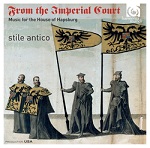 Wonderful,
soaring polyphonic music, to which you can listen closely and analyse
or allow to drift over according to your mood. The performances are
excellent and the recording – especially in 24-bit, but sounding fine
in mp3, too – does them full justice. Only those who insist on male-only
performances may object – and they would be ruling the Tallis Scholars
and The Sixteen out of the reckoning in this repertoire, too, which
I certainly don’t wish to do.
Wonderful,
soaring polyphonic music, to which you can listen closely and analyse
or allow to drift over according to your mood. The performances are
excellent and the recording – especially in 24-bit, but sounding fine
in mp3, too – does them full justice. Only those who insist on male-only
performances may object – and they would be ruling the Tallis Scholars
and The Sixteen out of the reckoning in this repertoire, too, which
I certainly don’t wish to do.
None of the music has exactly been over-exposed, though the Tallis work
for Pentecost, Loquebantur variis linguis, will be reasonably
familiar, with over 20 recordings* – though it has nothing to do with
the Imperial Court in particular or the Habsburgs in general, except
that it was probably composed during the reign of Queen Mary, who was
married to Philip of Spain. Even the intermittently reliable Wikipedia
and the much more reliable Grove Online will tell you that Quis dabit
oculis was composed by Costanzo Festa for the death of Queen Anne
of France, not Ludwig Senfl as per the Harmonia Mundi booklet.
* Don’t let this new recording tempt you to pass over The Tallis Scholars
(CDGIM203, 2 CDs for the price of one), Chapelle du Roi (SIGCD010 or complete set) or the Taverner Consort and Choir (5622302,
2 CDs at super-budget price), all with more music by Tallis.
Claudio MONTEVERDI (1567-1643) Madrigali
Volume 2: Mantova (excerpts from Books IV, V and VI, including Lamento
d’Arianna)
Les Arts Florissants/Paul Agnew
rec. live Cité de la Musique (Paris), 26-27 November 2012 (Fourth Book),
6-7 June 2013 (Fifth Book), and 15-16 January 2014 (Sixth Book). DDD
pdf booklet with texts and translations included
 LES
ARTS FLORISSANTS AF003 [74:00] – from emusic.com (mp3, 16- and 24-bit lossless)
LES
ARTS FLORISSANTS AF003 [74:00] – from emusic.com (mp3, 16- and 24-bit lossless)
Though it’s rather confusingly labelled Volume 2, this album from Les
Arts Florissants inaugurates a three-volume series devoted to Monteverdi’s
madrigals on their new in-house label. Each volume will be linked to
one of the cities that marked the composer’s life: the present opus
dedicated to Mantua (extracts from Books IV, V and VI) will be followed
by two others devoted to Cremona (April 2015 - Books I, II and III)
and Venice (February 2016 - Books VII and VIII). The scores benefit
from research by their associate conductor Paul Agnew and the performances
are all that we have come to expect from this ensemble.
Claudio MONTEVERDI (1567-1643)
Vespers of 1610 (including high and low settings of Magnificat)
The Sixteen/Harry Christophers
rec. St Augustine’s Church, Kilburn, London, 31 March – 3 April 2014.
DDD
pitch = 440’, 5th comma meantone temperament
pdf booklet with texts and translations included
CORO COR16126 [66:15 + 39:51] – from thesixteendigital.com (mp3, aac, 24-bit flac and alac)
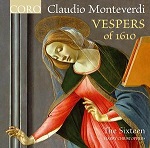 Harry
Christophers writes of having been ‘immersed in the joy that Monteverdi’s
music brings us’ as the recording progressed and that is certainly apparent
from the finished result. Any new recording of this work, however,
has to be very special: my benchmark version, from The King’s Consort
on Hyperion, has the great advantage of also including the associated
6-part Magnificat and Missa In illo tempore (CDA67531/2 – CD, mp3 and lossless from hyperion-records.co.uk)
and my runner-up from comes on a most inexpensive Erato (formerly Virgin 5616622) twofer (Taverner Consort/Andrew Parrott) and includes
excerpts from the Selva morale.
Harry
Christophers writes of having been ‘immersed in the joy that Monteverdi’s
music brings us’ as the recording progressed and that is certainly apparent
from the finished result. Any new recording of this work, however,
has to be very special: my benchmark version, from The King’s Consort
on Hyperion, has the great advantage of also including the associated
6-part Magnificat and Missa In illo tempore (CDA67531/2 – CD, mp3 and lossless from hyperion-records.co.uk)
and my runner-up from comes on a most inexpensive Erato (formerly Virgin 5616622) twofer (Taverner Consort/Andrew Parrott) and includes
excerpts from the Selva morale.
The inclusion on the new recording of both high and low settings of
the Magnificat and Lauda Jerusalem is something of a mixed
blessing: it allows us to compare the two* but you wouldn’t want to
hear both every time you play the recording. If you buy the CDs or
burn the download to CD, some of the most expensive players don’t have
a programmable facility; removing the tracks you don’t want in a programme
such as Winamp is possible but a nuisance – and you have to remember
which track numbers to remove.
* Harry Christophers writes in the notes: ‘There has been much scholarly
debate about the pitch of Lauda Ierusalem and the Magnificat.
These are notated in the part books in a combination of “high” (chiavetti)
clefs which dictates a downward transposition of a fourth. For this
recording I decided to include both versions, one at high pitch and
one at low, so that you the listener can determine your own preference.’
Captain Tobias HUME (c.1569-1645) Harke, Harke! Lyra Violls
Humors and Delights
Start ‘The Lady of Sussex delight’ [2:00]
An Almaine ‘The Lady of Canes delight’ [2:29]
A Humorous Pavin* [4:45]
Captaine Humes Galliard [2:40]
A Jigge [0:40]
Good Againe * [4:58]
The Pashion of Musicke ‘Sir Christopher Hattons choice’ [2:59]
A Souldiers Resolution [4:33]
A Souldiers Galiard [1:06]
What greater griefe * [4:17]
Touch me Sweetely [2:50]
Touch me lightly [1:57]
Tickle me quickly [0:39]
Tickell, Tickell [1:21]
The Earle of Pembrooke his Galliard [1:52]
Alas poore men * [8:58]
Sweet Ayre ‘The Earle of Arundels favoret’ [5;11]
Musicke and Mirth ‘The Lady Hattons delight’ [2:37]
A Careles Humor [1:40]
Harke, Harke [1:31]
The spirit of Gambo ‘The Lord Dewys favoret’ [2:01]
My Mistress hath a pritty thing [2:35]
Loves Farewell * [2:54]
Fain would I change that note [2:24]
This sport is ended [1:35]
Guido Balestracci (lyra viols) and Les Basses Réunies (Bruno Cocset
(viol and lyra viol), Richard Myron (consort bass), Bertrand Cuiller
(keyboards))
* performed on lyra violl ‘Drakkar’
rec. La Chapelle des Carmes de Vannes, France, 3-7 March, 2014. DDD
pdf booklet included
ALPHA ALPHA197 [70:32] – from 7digital.com (mp3) or stream from Qobuz
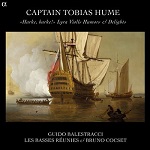 Hume
opened his First Book of Ayres in 1605 by writing:
Hume
opened his First Book of Ayres in 1605 by writing:
"I doe not studie Eloquence, or profess Musicke, alt[h]ough I doe
love Sence, and affect Harmony. My Profession being, as my Education
hath beene, Armes, the onely effeminate part of me, hath been Musicke;
which in mee hath beene alwayes Generous, because never Mercenarie."
Nowadays his martial exploits are forgotten but the musicke which
he professed not to study lives on. This is the second collection which
Alpha have brought us and there is quite a considerable overlap with
the earlier, very fine, The Passion of Music, ALPHA061,
which consisted of vocal as well as instrumental items – review.
Bruno Cocset’s team have already brought forth several, mostly well-received,
recordings for Alpha: music by Bach, Vivaldi, Geminiani, Boccherini,
Frescobaldi and Barrière, to which this album of Hume’s pieces is a
worthy successor.
Kirk McElhearn was not much taken with a Hyperion recording of Hume’s
music, performed by Susanne Heinrich on a solo viola da gamba (CDA67811 –
review), much preferring Jordi Savall (Alia Vox AV9837 –
stream from Qobuz).
I can see where he is coming from – there’s more passion in Savall’s
playing – but I enjoyed both, Heinrich encompassing more of what Hume
described as his ‘effeminate’ and ‘Generous’ side, Savall more of what
Hume’s contemporaries would have called ‘fancifull’. Most of those
coming fresh to Hume’s music, however, will probably prefer the greater
variety of instrumental colour on display on the new Alpha recording
to either of the solo recitals.
Though the review download from Outhere came at 192kb/s only – please,
if you want reviewers to do justice to your releases, let’s have at
least 320kb/s if not lossless quality – it sounds well enough to presume
that the 320kb/s offering from 7digital.com will do justice to these
fine performances.
François COUPERIN (1668-1733) Apothéoses
La superbe, Sonade en trio [7:50]
Concert instrumental sur le titre d’Apothéose composé à la mémoire
immortelle de l’incomparable Monsieur de LULLY. (Paris, 1725) [27:53]
Le Parnasse, ou L’apothéose de Corelli, Grande Sonade en Trio (Paris,
1724) [12:03]
La Sultane: Sonade en quatuor [9:02]
Amandine Beyer (violin)
Gli Incogniti (Alba Roca (violin), Anna Fontana (harpsichord), Francesco
Romano (theorbo), Baldomero Barciela, Filipa Meneses (violas da gamba))
HARMONIA MUNDI HMC902193 [57:16] – from eclassical.com (mp3, 16- and 24-bit lossless)
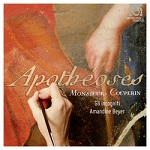 In
late 17th-century France the styles were are war, with ardent
supporters of the Italian style of Corelli and of the French style of
which Lully, though born in Italy, was the chief exponent. Then along
came François Couperin who, at one stroke with his Apothéose de Lully and Apothéose de Corelli, unified the styles and brought
harmony. That’s the story and elements of it are true, but the main
appeal for modern listeners lies more in the high quality of Couperin’s
own music than in the war of the styles.
In
late 17th-century France the styles were are war, with ardent
supporters of the Italian style of Corelli and of the French style of
which Lully, though born in Italy, was the chief exponent. Then along
came François Couperin who, at one stroke with his Apothéose de Lully and Apothéose de Corelli, unified the styles and brought
harmony. That’s the story and elements of it are true, but the main
appeal for modern listeners lies more in the high quality of Couperin’s
own music than in the war of the styles.
Recordings of these Apothéoses have come and gone and, surprisingly,
there are very few left in the catalogue: two classic versions from
Les Talens Lyriques/Christophe Rousset and ECO/Raymond Leppard, both
from Decca, remain as downloads only, though I imagine that the former
will reappear in one of their big boxes. Of those that remain I reviewed
two in 2013/11,
from London Baroque (BIS-CD-1275) and William Christie and Christophe
Rousset (Harmonia Mundi HMA1951269). The instrumental mix on
the BIS recording is rather richer than from Gli Incogniti and you may
or may not prefer the spoken introductions on BIS, delivered in perfect
Comédie Française tones. That would be my first choice, but there’s
also plenty to enjoy on both the new and the older Harmonia Mundi versions.
If DG were to reissue their 1970s Archiv recording (the two Apothéoses plus Leclair’s  Violin
Sonata Le tombeau: Edward Melkus et al), that would be
a version to go for.
Violin
Sonata Le tombeau: Edward Melkus et al), that would be
a version to go for.
There’s one other part of the story of Couperin’s uniting of the styles,
the Nouveaux Concerts or Les Goûts Réunis (the tastes
united). I mentioned two Chandos recordings of these in 2013/11 (CHAN0684 and CHAN0729) but two items also appear on an
Alpha recording: Concertos Nos. 9 and 14 are coupled with excerpts from L’art de toucher le clavecin and La Sultanne on ALPHA062 [62:53] – from eclassical.com (mp3 and lossless: stream from Qobuz).
(The CD seems to be deleted). The performers are François Fernandez,
Luis Ottavio Santos (violins); Alfredo Bernardini (oboe); Jérôme Hantaï,
Emmanuel Balssa (viols); François Guerrier, Elisabeth Joyé (harpsichords).
Most of the music here is for solo harpsichord but the concertos from Les Goûts Réunis are performed with varied instrumentation and
the whole album is very enjoyable.
Jean-Philippe RAMEAU (1683-1764)
Pièces de clavecin en concerts: concerts 1-5 (1741)
Christophe Rousset (harpsichord); Ryo Terakado (violin); Kaori Uemura
(viola da gamba)
rec. c.1992. DDD
HARMONIA MUNDI HMA1951418 [73:20] – from eclassical.com (mp3 and lossless)
Pièces de clavecin en concerts: concerts 1-5
Les Timbres (Yoko Kawakubo (violin); Myriam Rignol (viola da gamba);
Julien Wolfs (harpsichord))
rec. ? (No details supplied)
FLORA FLO3113 [69:23] – from eclassical.com (mp3, 16- and 24-bit lossless)
Pièces de clavecin en concerts: 2ème concert [16:28]
Orphée : cantata for tenor, oboe, violin and continuo [17:05]
Pièces de clavecin en concerts: 5ème concert [12:58]
Le berger fidèle : cantata for tenor, oboe, violin and continuo
[15:25]
Mathias Vidal (tenor)
Amarillis (Héloïse Gaillard (baroque oboe and recorder), Violaine Cochard
(harpsichord), Alice Piérot (violin), Marianne Muller (viola da gamba))
rec. La Courroie, Entraigues-sur-la-Sorgue (France). Date?
pdf booklet with texts and translations included
NAÏVE V5377 [61:56] – from eclassical.com (mp3, 16- and 24-bit lossless)
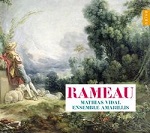
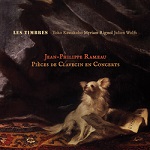
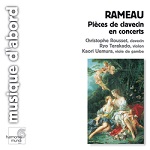 Only
those who insist on having the flute in these pièces de clavecin
en concerts will be disappointed with either the classic Harmonia
Mundi or the new Flora recording. In fact, what we have
here seems to have become the preferred line-up for these works, with
Aapo Häkkinen et al (Alba) and Trevor Pinnock et al (Channel
Classics) offering the same instrumental combination on recordings which
I reviewed and liked in June
2012/2.
Only
those who insist on having the flute in these pièces de clavecin
en concerts will be disappointed with either the classic Harmonia
Mundi or the new Flora recording. In fact, what we have
here seems to have become the preferred line-up for these works, with
Aapo Häkkinen et al (Alba) and Trevor Pinnock et al (Channel
Classics) offering the same instrumental combination on recordings which
I reviewed and liked in June
2012/2.
One word of caution: readers in the UK should be able to find the Harmonia
Mundi on sale on CD for around £6, which is slightly less than the eclassical.com
price of $13.20.
The Naïve recording intersperses two of the concerts with good
performances of cantatas for tenor and small ensemble, Orphée and Le Berger fidèle. Neither is over-burdened with recordings:
two others for Orphée and none for Le Berger fidèle in
the current catalogue.
Jean-Philippe RAMEAU (1683-1764) Concerts En Sextuor
Sixième Concert: La Poule; Menuets; L’Enharmonique; L’Égyptienne;
Les Sauvages [18:23]
Premier Concert: La Coulican; La Livri; La Vézinet [10:08]
Deuxième Concert: La Laborde; La Boucon; L’Agaçante; Menuets [15:44]
Troisième Concert: La La Poplinière; La Timide; Tambourins [11:26]
Quatrième Concert: La Pantomime; L’Indiscrète; La Rameau [9:08]
Cinquième Concert: La Forqueray; La Cupis; La Marais [13:03]
Les Dominos (Florence Malgoire, Stéphanie de Failly, Sue Ying Koang
(violins); Simon Heyerick (viola); Claire Giardelli (basse de violon
with 5 strings); Cyril Poulet (cello); Evolène Kiener (bassoon); Serge
Saitta and Amélie Michel (flutes and piccolos); Laurent Stewart (harpsichord))/Florence
Malgoire
RICERCAR RIC350 [77:55] Due for release in UK on 20
October 2014.
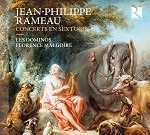 These Concerts de Monsieur Rameau were transcriptions in six parts
by a certain M. Decroix after the composer’s death of adaptations that
Rameau seems to have planned to make from his harpsichord pieces, the Pièces de Clavecin en Concert, with accompaniment by violin or
flute and bass viol. In most cases the filled-out versions work very
well and this album will do very nicely as a replacement for the Decca
recording with Les Talens Lyriques, now download only.
These Concerts de Monsieur Rameau were transcriptions in six parts
by a certain M. Decroix after the composer’s death of adaptations that
Rameau seems to have planned to make from his harpsichord pieces, the Pièces de Clavecin en Concert, with accompaniment by violin or
flute and bass viol. In most cases the filled-out versions work very
well and this album will do very nicely as a replacement for the Decca
recording with Les Talens Lyriques, now download only.
The programme opens with the sixth suite, presumably because it contains
the best-known music, La Poule, with its clucking hen imitation,
and Les Sauvages, adapted from part of Les Indes Galantes,
a movement oft (too oft?) performed on Classic FM.
I can’t give a recording date or place or comment on the booklet, as
I had only a press release to hand when I obtained the recording.
George Frideric HANDEL (1685-1759)
Jephtha, HWV70 (1751/2)
Libretto by Rev. Thomas Morell
Jephtha - James Gilchrist (tenor)
Storgè - Susan Bickley (mezzo)
Iphis - Sophie Bevan (soprano)
Hamor - Robin Blaze (alto)
Zebul - Matthew Brook (bass)
Angel - Grace Davidson (soprano)
The Sixteen/Harry Christophers
rec. St Augustine’s Church, Kilburn, London, January 2014. DDD
booklet with text included
CORO COR16121 [3CDs 58:32 + 57:24 + 52:17] – from thesixteen.com (mp3, aac and 24/96 flac and alac) or stream in CD-quality sound from Qobuz.
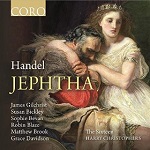 Jephtha
belongs among the famous makers of rash promises concerning their children,
along with Abraham and Agamemnon. Abraham’s son Isaac was spared from
being sacrificed by divine intervention but Jephtha’s daughter – named
Iphis in Handel’s oratorio – and Agamemnon’s daughter Iphigenia paid
the price.
Jephtha
belongs among the famous makers of rash promises concerning their children,
along with Abraham and Agamemnon. Abraham’s son Isaac was spared from
being sacrificed by divine intervention but Jephtha’s daughter – named
Iphis in Handel’s oratorio – and Agamemnon’s daughter Iphigenia paid
the price.
The eighteenth-century Enlightenment taste was not for human sacrifice,
so Handel’s librettist, a priest who knew that Deuteronomy forbids human
sacrifice, and a classicist well aware of the Agamemnon parallel, found
a loophole in the Hebrew text of the Book of Judges, whereby Jephtha
dedicates his daughter as a virgin to the service of God: the Hebrew
word for sacrifice apparently allows such a meaning and the final fate
is at least left open in the Bible: ‘he fulfilled the vow that he had
made; she died a virgin’ (Judges 11.39, NEB). In an alternative version
of the story of Iphigenia, Iphigenia in Tauris (plays by Euripides
and Goethe, opera by Gluck), Artemis saved her and took her to become
her priestess.
Jephtha is, nevertheless, Handel’s last and darkest oratorio.
At the end of the final chorus of Act II, How dark O Lord are they
decrees, with ever-diminishing sight in his left eye, he wrote poignantly
‘Reached here on 13 February 1751, unable to go on owing to weakening
of the sight of my left eye.’
Some time ago I reviewed a recording on the Carus label, conducted by Mathias Grünert (83.422,
3 CDs) and found myself somewhat lukewarm, preferring both the Anglophone
cast and greater sense of impetus of John Eliot Gardiner. The latter,
formerly on Philips, was at that time available only as a download,
but it’s now available again as a 3-CD set on Decca Originals (4780398).
At around £16 (£9.99 as a download in 320kb/s mp3 from 7digital.com ), that Gardiner set is a real bargain and, though there
are other versions to consider, that’s the benchmark against which to
judge the new Coro recording. There’s also a 2-CD set on BIS, a modern-instrument
version conducted by Fabio Biondi, better known for directing period
performances, but it’s rather heavily cut and Johan van Veen was less
than overwhelmed by it – review.
If you must economise, the Brilliant Classics set which Robert Hugill
thought a decent second-best – review – remains available for around £10 with a different catalogue number
and cover (94688). If you download in 320kb/s mp3 from 7digital.com,
it costs even less, at £5.49.
I sampled that Brilliant recording, with Marcus Creed directing the
Akademie für alte Musik, in its original Berlin Classics incarnation
and there’s no doubt that it well worth considering, especially for
the contribution of John Mark Ainsley, but given that you can purchase
the Coro recording for just under £20 – see below for download prices
– though the CDs are rather more expensive in the US at around $48 –
the new version presents the strongest challenge yet to the Gardiner
set.
Here I must confess that I came to The Sixteen not with a completely
free mind, as I couldn’t help remembering a 5-star review in The
Guardian of the performance which immediately preceded the recording.
I’m sure, however, that I haven’t been over-influenced by that review – I didn’t look at it again in detail until I’d made up my own mind
– and then I found myself agreeing with almost every detail.
The test aria for Jephtha comes at the beginning of Act III: ‘Waft her
angels to the skies’, which frequently features in collections, as on
Mark Padmore’s very fine recent album, As steals the Morn (Harmonia
Mundi HMU907422 – see Download
News 2014/8). James Gilchrist makes as effective an impression
here as I’ve ever heard, at a slow tempo, yet without laying on the
emotion too thickly. As opposed to the confident leader whom he portrays
in the earlier acts, here he’s just the father wishing the best for
the daughter whom he heedlessly sacrificed. Taking the da capo repeat, not universally observed, gives due weight to his performance.
Earlier, in ‘Deeper and deeper still’ (II iv), Gilchrist perfectly expresses
Jephtha’s anguish, torn between emotion and upholding his promise, almost
faltering on the final ‘I can no more’. After that the chorus’s great
set piece, ‘How dark, O Lord, are Thy decrees’ is perfectly delivered
by The Sixteen chorus.
Sophie Bevan’s big moment as Iphis comes earlier, in II: i with ‘Tune
the soft melodious lute’. Here, too, Harry Christophers adds a harp
to the mix, as well as the lute mentioned in the aria – actually a big
lute, a theorbo – but I didn’t find this harking-back to the ‘bad old
days’ as much of a problem as I expect that many will. I doubt if even
the sternest purists will allow the anachronism to spoil their appreciation
of Sophie Bevan’s singing. After hearing this rendition, it’s surprising
that the aria doesn’t feature more often in recital albums – just one
such in the current UK catalogue.
With fine supporting performances from Susan Bickley, Robin Blaze and
Matthew Brook, very good recording and a fine booklet, this new set
has a strong claim. Listening again to some of the highlights of the
older Gardiner set has not altered that opinion, though there’s a case
for preferring individual aspects of one or the other, such as the faster
tempo of ‘Waft her, angels’ on the older set.
Both the new Coro and the older Decca confirm Jephtha as one
of Handel’s and Morell’s major achievements, despite the latter’s inclusion
in the chorus ‘How dark, O Lord, are Thy decrees’ of the line ‘Whatever
is, is right’ from Pope’s Essay on Man, one of my least favourite
poets – in that and much else I’m as one with Keats.
The new set comes with a bonus. In his 1753 revival Handel inserted
an additional air for Zebul at the beginning of Act II scene ii (‘Freedom
now once more possessing’), making over to Zebul the first part of Jephtha’s
recitative. It’s good that Coro include this as an appendix, but it’s
also awkward to know what to do with it – you won’t want to hear it
after the final chorus and some of the best SACD and CD players don’t
allow you to programme the tracks. In any case, it’s not on the same
disc as the rest of Act II and to programme it into the download would
require the wholesale renumbering of tracks.
There’s quite a price and quality gap in the offerings from thesixteen.com
between mp3 and aac (£14.50 each) and 24/96 flac and alac (£24.99 each),
with no 16-bit version. The latter are large files, 3GB each, which
proved very slow to download and somewhere along the line the connection
got dropped when almost complete, so at first I had to settle for mp3
and streaming from Qobuz in CD-quality 16/44.1. A second, successful,
attempt to download the 24-bit version took ten hours.
Qobuz offer that 16-bit compromise as a download for £15.99 and that may well
be the best option. The mp3, at the full 320kb/s, is very good, but
CD-quality adds a touch of firmness, especially in the bass and the
24-bit, once obtained, is marginally firmer still. I’m not sure if
Qobuz provide the booklet: it doesn’t accompany their streamed version,
but the Barbican programme for 14 January 2014, with notes and libretto,
is available here.
George Frideric HANDEL (1685-1759)
Siroe Re di Persia, opera in three Acts, HWV24 (1728)
Siroe - Yosemeh Adjei (counter-tenor)
Emira - Anna Dennis (soprano)
Laodice - Aleksandra Zamojska (soprano)
Medarse - Antonio Giovannini (counter-tenor)
Cosroe - Lisandro Abadie (bass)
Arasse - Ross Ramgobin (bass)
Festspiel-Orchester Göttingen/Laurence Cummings
rec. live, Deutsches Theather Göttingen, Germany, 10 May 2013. DDD
pdf booklet with texts included
ACCENT ACC26401 [64:23 + 64:13 + 55:43] – from eclassical.com (mp3 and lossless)
 This
is the only recording of Siroe, apart from some individual arias;
the earlier Newport Classics and Harmonia Mundi versions have been deleted.
It marks the beginning of a planned cooperation between Accent and the
Göttingen Handel Festival, with Faramondo, recorded there in
May 2014 slated to appear next.
This
is the only recording of Siroe, apart from some individual arias;
the earlier Newport Classics and Harmonia Mundi versions have been deleted.
It marks the beginning of a planned cooperation between Accent and the
Göttingen Handel Festival, with Faramondo, recorded there in
May 2014 slated to appear next.
Siroe was not a great success in 1728, running for only 18 performances,
despite the appearance of the great Senesimo in the title role. The
problem seems to have been: great music, shame about the convoluted
plot. This recording makes some cuts, though fewer than on the earlier
versions and none of them are crucial. To compensate we have orchestral
additions from Handel’s other music, including the Concerto Grosso,
Op.6/12.
My colleague Robert Hugill has already reviewed this recording on his
own website, Planet
Hugill, so I shall limit myself to a few comparisons with recordings
of individual arias. On a Sony album entitled Händel Affetti Barocchi (88697075912), Marijana Mijanovic sings Siroe’s Deggio morire,
o stelle in a manner rather too heavy for music composed for Senesimo.
That Sony album also offers a stylish performance of the Overture to Siroe, but I can’t recommend Mijanovic’s Handel. By contrast
Yosemeh Adjei’s performance of this aria from the final act comes as
a great relief – a faster tempo and a lighter style serve to make the
sentiments just as moving without laying it on thickly.
Catherine Bott and Emma Kirkby as Rival Queens sing the conclusion of
Act II of Siroe on tracks 19-22 of a Hyperion recording with
that title (now included in 3-CD set, CDS44271/3). I made that set
a Bargain of the Month –
review – and Kirk McElhearn was also impressed – review – so to judge the new recording by that standard is to judge by the
highest. That Aleksandra Zamojska and Anna Dennis come very close on
CD2, tracks 14-17 – indeed, as befits a live performance, the recitative
is livelier, albeit with a slightly over-prominent harpsichord – confirms
my high opinion of this new recording. Anna Dennis as Emira is fuller-toned
than Emma Kirkby but her singing is equally enjoyable and she takes
the da capo repeat in Non vi piacque, ingiusti dei, which
Kirkby doesn’t.
Lorenzo Regazzo and Ildebrando d’Arcangelo have both included Cosroe’s Ove son! … Gelido in ogni vena, from Act III ii on Handel
recitals (Naïve OP30472 and DG 4778361 respectively). Both have pleasant
voices, Regazzo sounding somewhat reminiscent of Bryn Terfel, and I
enjoyed both interpretations. Lisandro Abadie, slightly lighter of
voice than both, gives a sprightlier interpretation, setting the seal
on my appreciation of all the major singers on the Accent recording.
The live performance brings with it the hazard of some stage noise and
there’s brief applause at the end of acts, which I mention for those
who dislike it. Otherwise the recording is good and it comes with a
fine booklet.
George Frideric HANDEL (1685-1759) Arias
Radamisto HWV12a: Quando mai, spietata sorte [3:08]
Alcina HWV34: Mi lusinga il dolce affetto [7:45]
Verdi prati [4:50]
Stà nell’Ircana [6:00]
Hercules HWV60: There in myrtle shades reclined [3:55]
Cease, ruler of the day, to rise [5:35]
Where shall I fly? [6:45]
Giulio Cesare in Egitto HWV17: Cara speme, questo core [5:55]
Ariodante HWV33: Con l’ali di costanza [5:42]
Scherza infida! [11:41]
Dopo notte [7:15]
Alice Coote (mezzo)
The English Concert/Harry Bicket
rec. All Hallows, Gospel Oak, London, September 2013. DDD.
pdf booklet with texts and translations included
Hyperion CDA67979 [68:31] – from hyperion-records.co.uk (mp3, 16- and 24-bit lossless)
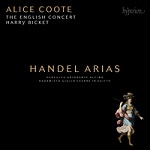 Alice
Coote, who has been mentioned in the same breath as Kathleen Ferrier
and Janet Baker, has a wide-ranging repertoire, having recorded Schubert’sWinterreise for Wigmore Hall and an English Songbook for Hyperion (The
Power of Love, CDA67888).
Her Handel credentials were established when she recorded Messiah with King’s College, Cambridge and Stephen Cleobury (Warner/EMI CD and
DVD) and The Choice of Hercules for Hyperion (CDA67298).
Alice
Coote, who has been mentioned in the same breath as Kathleen Ferrier
and Janet Baker, has a wide-ranging repertoire, having recorded Schubert’sWinterreise for Wigmore Hall and an English Songbook for Hyperion (The
Power of Love, CDA67888).
Her Handel credentials were established when she recorded Messiah with King’s College, Cambridge and Stephen Cleobury (Warner/EMI CD and
DVD) and The Choice of Hercules for Hyperion (CDA67298).
In view of her high reputation, I expected to be bowled over by this
new album. I wasn’t, but I still enjoyed it. Instead of the surface
emotion that can be stirred by Verdi prati – I’m thinking in
particular of arrangements where the voice is replaced by a solo oboe,
as on Albrecht Mayer’s recital, DG 4765681 – Alice Coote thinks
herself into the soul of the music. At that point in Alcina,
Ruggiero sees the enchanted island for what it is and, though still
tempted by its beauty, knows that he must leave and she manages to combine
both emotions.
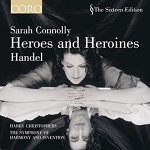 The
two arias from the little-known Hercules are among the most successful;
in these, as in most of the rest of the programme, Coote goes toe to
toe with Sarah Connolly with the Symphony of Harmony and Invention and
Harry Christophers on Coro COR16025 [63:44] – from thesixteendigital.com (mp3, aac and lossless). In Scherza infida, too, Coote and Connolly
are in competition. If I say that Coote is more successful in capturing
the despair of this aria than the bravura of the preceding track
from the same opera, that’s merely to admit that no one performance
can be all things to all people.
The
two arias from the little-known Hercules are among the most successful;
in these, as in most of the rest of the programme, Coote goes toe to
toe with Sarah Connolly with the Symphony of Harmony and Invention and
Harry Christophers on Coro COR16025 [63:44] – from thesixteendigital.com (mp3, aac and lossless). In Scherza infida, too, Coote and Connolly
are in competition. If I say that Coote is more successful in capturing
the despair of this aria than the bravura of the preceding track
from the same opera, that’s merely to admit that no one performance
can be all things to all people.
Dopo notte, which ends the programme, also features on the Coro
album. It is, as the Hyperion notes point out, a euphoric outpouring
and it receives a joyful performance to round off the proceedings.
Not everything on this recording comes fully to life, but that’s certainly
not the case here. I should add that Ralph Moore shared my reservations
to a greater extent – review.
The recording – especially in 24-bit format – and the notes in the booklet
are all that we have come to expect from Hyperion.
George Frideric HANDEL (1685-1759)
Il Trionfo del Tempo e del Disinganno, HWV46a
Belezza - Lucy Crowe (soprano)
Piacere - Anna Stephany (soprano)
Disinganno - Hilary Summers (contralto)
Tempo - Andrew Staples (bass)
Early Opera Company/Christian Curnyn
rec. Wigmore Hall, London, 29 January 2010. DDD
pdf booklet included
WIGMORE HALL LIVE WHLIVE0042 [2:17:22] – from classicsonline.com (mp3) or stream from Naxos Music Library or Qobuz (no booklet)
‘This production fails to bring the interpretation I had been hoping
for. On balance it’s no better than the two recent recordings I have
mentioned before [de Marchi/Hyperion and Haïm/Virgin].’ See review by Johan van Veen.
Belezza - Deborah York (soprano)
Piacere - Gemma Bertagnolli (soprano)
Disinganno - Sara Mingardo (contralto)
T empo – Nicholas Sears (bass)
Concerto Italiano / Rinaldo Alessandrini
with 2-CD set of Handel Arias: Sandrine Piau, Maria Bayo, Sara Mingardo,
Les Talens Lyriques/Christophe Rousset; Capriccio Stravagante/Skip Sempé;
Concerto Italiano / Rinaldo Alessandrini
rec. Villa Mondragone, Monteporzio Catone, Italy, September 2000. DDD
NAIVE OP30440 [2:12:58 + bonus 2:10:38 = 4:23:52] – from 7digital.com (mp3, no booklet) or stream from Qobuz.
‘You will not be disappointed by this lively and vivid account.’ See review by Robert Hugill.
Bellezza - Roberta Invernizzi (soprano)
Piacere - Kate Aldrich (mezzo)
Disinganno - Martin Oro (counter-tenor)
Tempo - Jörg Dürmüller (tenor)
Academia Montis Regalis / Alessandro de Marchi
rec. Oratorio Santa Croce (Sala Ghislieri), Mondovì, Italy, 12-16 June,
2007. DDD
pdf booklet with texts and translations included.
HYPERION CDA67681/2 [68:07 + 69:19] – from hyperion-records.co.uk
(mp3 and lossless)
‘[I]f I had to choose a single performance, I think I might well (…
I haven’t had time to listen again to all three of the other versions)
choose this current one – balanced, assured and radiant with sympathetic
understanding.’ See review by Glyn Pursglove.
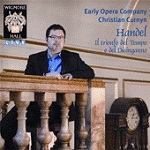
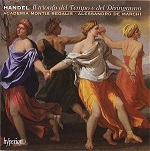
 I
mentioned the recent Delphian recording of the final, English-texted
version of this oratorio some time ago and you’ll find my full review of that set and a review by Geoffrey Molyneux on the main MusicWeb International pages. That
version came at the end of Handel’s life but its origins date from fifty
years earlier when he was a young composer in Rome, working with an
Italian text written by Cardinal Pamphili, and that earlier version
is recorded on these three sets. I enjoyed hearing all those listed
here – including the Wigmore Hall recording, which I liked better than
Johan van Veen (see above).
I
mentioned the recent Delphian recording of the final, English-texted
version of this oratorio some time ago and you’ll find my full review of that set and a review by Geoffrey Molyneux on the main MusicWeb International pages. That
version came at the end of Handel’s life but its origins date from fifty
years earlier when he was a young composer in Rome, working with an
Italian text written by Cardinal Pamphili, and that earlier version
is recorded on these three sets. I enjoyed hearing all those listed
here – including the Wigmore Hall recording, which I liked better than
Johan van Veen (see above).
I’m sure it’s an oversight that 7digital.com have conflated Il Trionfo with a 2-CD set of arias. That makes it a huge bargain and partly
compensates for the lack of a libretto, though you can find that online
and Hyperion make it available to all comers.
Friedrich der Grosse/Frederick the Great 1712-2012:
Music for the Berlin Court
Johann Gottlieb GRAUN (1703-1771) Ouvertüre und Allegro,
GraunWV A:XI:2 [11:47]
Christoph NICHELMANN (1717-1762) Concerto per il Cembalo concertante,
D-B M.TH.169 [17:25]
FRIEDRICH II ‘Der Grosse’ (1721-1786) Sonata, per il Flauto
traverso solo e Basso ‘pour Potsdam’, Nr.190 [8:47]
Johann Gottlieb GRAUN Concerto per il Viola da Gamba concertata,
GraunWV A:XIII:14 [24:27]
Carl Philipp Emanuel BACH (1714-1788) Sinfonie in D, Wq 183/1
(H663) [10:12]
Akademie für Alte Musik Berlin
rec. Teldec Studio, Berlin, November 2011. DDD
pdf booklet included
HARMONIA MUNDI HMC902132 [72:35] – from emusic.com (mp3, 16- and 24-bit lossless)
Music from the Court of Frederick the Great
Carl Philipp Emanuel BACH (1714–1788) Trio Sonata in B flat [19:36]
Franz BENDA (1709–1786) Violin Sonata in a minor [13:02]
FREDERICK the Great (1712–1786) Flute Sonata in C [8:29]
Carl Philipp Emanuel BACH Harpsichord Sonata in A, H186 [15:55]
Johann Gottlieb GRAUN (1702/3–1771) Trio Sonata in g minor
[9:37]
Johann Joachim QUANTZ (1697–1773) Flute Concerto in A [12:06]
Collegium Musicum 90 (Rachel Brown (flute), Micaela Comberti (violin/viola),
Jane Coe (cello), Lars Ulrik Mortensen (harpsichord))/Simon Standage
(director/violin)
rec. St Michael’s Church, Highgate, London; 15–17 February 1993. DDD
pdf booklet available
CHANDOS CHACONNE CHAN0541 [79:10] – from theclassicalshop.net (mp3 and lossless)
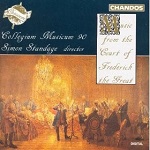
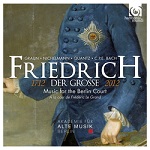 It’s
no surprise that music for the court of Frederick the Great, especially
on the Chandos recording, should feature so much music for the
King’s own instrument, the flute. It’s Rachel Brown whose performances
on that instrument are the stand-outs on the Chandos but all concerned
make this well worthwhile; though one might have expected it to have
been reissued by now, it’s still emphatically worth having at full price
when the small-scale performances and recording are so good. Downloading
reduces the cost to £7.99 (mp3) or £9.99 (lossless).
It’s
no surprise that music for the court of Frederick the Great, especially
on the Chandos recording, should feature so much music for the
King’s own instrument, the flute. It’s Rachel Brown whose performances
on that instrument are the stand-outs on the Chandos but all concerned
make this well worthwhile; though one might have expected it to have
been reissued by now, it’s still emphatically worth having at full price
when the small-scale performances and recording are so good. Downloading
reduces the cost to £7.99 (mp3) or £9.99 (lossless).
The new Harmonia Mundi recording casts its net slightly wider:
with no overlaps between it and the Chandos – several of the works on
the new recording have the field to themselves – and fine performances
and recording all round, both are well worth your attention.
Johann Christoph Friedrich FÖRSTER (1693-1745) (attrib. GRAUN)
Concerto à 5 for oboe, strings and continuo in c minor (D:XIII:165)
[13:50]
Johann Baptist Georg NERUDA (c.1711-1776) (attrib. GRAUN)
Sinfonia Friderico for 2 violins, viola and continuo in G (D:XII:108)
[6:51]
Johann Gottlieb GRAUN (1701/02-1771) or Carl Heinrich GRAUN
(1703/04-1759) (?)
Concerto à 5 for oboe, strings and continuo in F (Cv:XIII:128) [9:57]
Quartet for 2 violins, viola, violoncello and continuo in c minor (Cv:XIV:19)
[9:08]
Concerto à 5 for oboe, strings and continuo in g minor (Cv:XIII:144)
[10:59]
Trio sonata for 2 violins and continuo in b minor (C:XV:92) [11:45]
J. G. or C.H. GRAUN (attrib.) Concerto à 4 for oboe d’amore,
2 violins and continuo in A (D:XIII:179) [8:49]
Xenia Löffler (oboe and oboe d’amore); Batzdorfer Hofkapelle
rec. St. Nicolai, Polditz, Germany, 6-8 October 2012. DDD
pdf booklet included
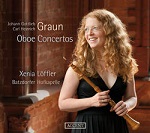 ACCENT
ACC24280 [71:32] – from eclassical.com (mp3 and lossless)
ACCENT
ACC24280 [71:32] – from eclassical.com (mp3 and lossless)
The Harmonia Mundi and Chandos albums (above) happily ascribe some of
the music included to Johann Gottlieb Graun but it appears from the
notes to the Accent album that matters are less straightforward than
we may have believed, both in terms of what music Graun actually composed
and which Graun is concerned, since the authoritative catalogue is unable
to discriminate between the brothers. As with the music of Quantz (below)
most of these works exist in MS form, in this case with just the name
‘Graun’ attached. If you want a wholly Graun or Graun-attributed album,
the performances do the music justice.
Johann Joachim QUANTZ (1697-1773)
Flute Concerto No.256 in A [17:17]
Flute Concerto No.5 in b minor [14:13]
Flute Concerto No.216 in c minor [16:26]
Flute Concerto No.29 in G [11:54]
Flute Concerto No.290 in g minor [15:33]
Rachel Brown (flute); The Brandenburg Consort/Roy Goodman
rec. St Jude-on-the-Hill, Hampstead Garden Suburb, London, October 1996.
DDD
pdf booklet included.
HYPERION CDA66927 [75:23] – from hyperion-records.co.uk (mp3 and lossless) or CD from Archive Service
Flute Concerto, QV 5:196 in g minor (No.262) [18:30]
Flute Concerto, QV 5:74 in D (No.70) [13:12]
Flute Concerto, QV 5:15 in C (No.188) [16:33]
Flute Concerto, QV 5:174 in G (No.161) [16:12]
Csalog Benedek (baroque flute); Aura Musicale/Balázs Máté
HUNGAROTON HCD31916 [64:27] – from eclassical.com (mp3 and lossless)
Sei Duetti, Op.2 (Berlin, 1759)
Elysium Ensemble (Greg Dikmans (flute); Lucinda Moon (violin))
rec. The Salon, Melbourne Recital Centre, Australia, 10–13 October 2011.
DDD
A = 413 Hz.
pdf booklet included
RESONUS RES10136 [67:07] – from resonusclassics.com (mp3, aac, 16- and 24-bit lossless) or stream from Qobuz
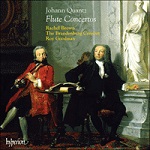
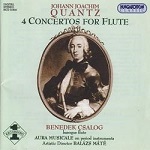
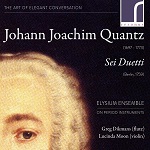 Charming,
elegant music. Though based at the Saxon Kapelle in Dresden, Quantz
had travelled widely and absorbed elements of the French style and is
often regarded as one of the ‘missing links’ between baroque and classical.
As a regular visitor to the court of Frederick the Great – a Francophile
and a flautist, who took lessons from Quantz – it’s hardly surprising
that the flute figures so prominently in his music, especially after
he had settled in Berlin in 1741. As a highly paid servant of the King,
most of his music was kept in the royal archives and very little was
ever published: the Duetti on Resonus were only his Op.2, though
it’s apparent from the numbers of the concertos on the Hyperion recording
that he was a prolific composer.
Charming,
elegant music. Though based at the Saxon Kapelle in Dresden, Quantz
had travelled widely and absorbed elements of the French style and is
often regarded as one of the ‘missing links’ between baroque and classical.
As a regular visitor to the court of Frederick the Great – a Francophile
and a flautist, who took lessons from Quantz – it’s hardly surprising
that the flute figures so prominently in his music, especially after
he had settled in Berlin in 1741. As a highly paid servant of the King,
most of his music was kept in the royal archives and very little was
ever published: the Duetti on Resonus were only his Op.2, though
it’s apparent from the numbers of the concertos on the Hyperion recording
that he was a prolific composer.
The Hyperion recording was hailed as the beginning of an awakened
interest in Quantz’s music but, sadly, the album has now fallen into
the Archive-only category and has even had to be discounted as a download.
With performances, recording and booklet of such high quality that’s
a great shame: perhaps a reissue on the budget Helios label might spark
new interest. Surely it can’t be that classical music buyers share
Mozart’s supposed dislike of the flute? Despite which, of course, he
wrote some ethereal music for the instrument. Rachel Brown plays a
copy of an instrument made by Quantz himself and the Hanover band support
in period style.
The Hungaroton – download only: no CD in the UK catalogue – is
also performed on period instruments. None of the works here overlap
with those on Hyperion: indeed, all are claimed on the cover as first
recordings. The performances – or the recordings – sound a little heavier
than those on Hyperion, though not unduly so, and I can’t find any information
about the date when they were set down. I’d go for the Hyperion first
but this would make a good successor if you like what you hear there.
The Elysium Ensemble on Resonus, who also perform on period instruments,
have employed the writings of Quantz, C.P.E. Bach and others to determine
an authentic period style for the Duetti, but that doesn’t mean
that the performances are stuffy. This may not be exciting music –
it isn’t intended to be – but all concerned, performers and recording
engineers, have conspired to make this an ethereal experience. The
booklet is a model of clear and valuable information. Better still,
this is advertised as the start of a new project supported by the Early
Music Studio at the Melbourne Conservatorium.
Recording of the Month
Franz Joseph HAYDN (1732-1809)
Keyboard Concerto No.3 in F with French horns and strings, Hob.XVIII:3
[21:18]
Keyboard Concerto No.4 in G, Hob.XVIII:4 [20:00]
Keyboard Concerto No.11 in D, HobXVIII:11 [19:11]
Jean-Efflam Bavouzet (piano)
Manchester Camerata/Gábor Takács-Nagy
All cadenzas by Jean-Efflam Bavouzet
rec. Royal Northern College of Music Concert Hall, Manchester, England,
14-15 October 2013. DDD
pdf booklet included
CHANDOS CHAN10808 [60:33] - from theclassicalshop.net (mp3, 16- and 24-bit lossless) or stream from Naxos
Music Library
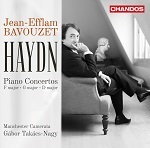
 I’ve
never quite managed to love or even like Haydn’s keyboard concertos
to the same extent as those of Mozart and Beethoven and, truth to tell,
even here the early concertos Nos. 3 and 4 still sound attractive but
conventional. That’s not to disparage the very fine performances, with
Jean-Efflam Bavouzet applying such a delicate touch to the modern Yamaha
piano that you might almost be listening to a fortepiano. It’'s hardly
credible that this is the pianist who recently gave us such fine performances
of the Prokofiev concertos (CHAN10802 – 2014/1).
With chamber-scale accompaniment, this is about as good a case as can
be made for these works.
I’ve
never quite managed to love or even like Haydn’s keyboard concertos
to the same extent as those of Mozart and Beethoven and, truth to tell,
even here the early concertos Nos. 3 and 4 still sound attractive but
conventional. That’s not to disparage the very fine performances, with
Jean-Efflam Bavouzet applying such a delicate touch to the modern Yamaha
piano that you might almost be listening to a fortepiano. It’'s hardly
credible that this is the pianist who recently gave us such fine performances
of the Prokofiev concertos (CHAN10802 – 2014/1).
With chamber-scale accompaniment, this is about as good a case as can
be made for these works.
No.11 is a different kettle of fish, a more powerful work dating from
c.1800 – that magical turn-of-the-century date – and the only one specifically
named in the score as for harpsichord or piano. It receives a
performance to match and that tilted the balance towards my making this
a Recording of the Month, along with the fact that the recent Gramophone
award for the Prokofiev recording has made me listen again and conclude
that I didn’t recommend that album enthusiastically enough.
If you wish to economise, the mp3 at £7.99 is very good, with
small but significant incremental improvements at each step up the ladder
from the 16- and 24-bit lossless (£9.99 and £13.99 respectively).
See also review of CD by David Barker.
Bargain of the Month
Wolfgang Amadeus MOZART (1756-1791)
Piano Concerto No.20 in d minor, K466 [33:29]
Piano Concerto No.21 in C, K467 [28:27]
Piano Concerto No.19 in F, K459 [26:33]
Piano Concerto No.22 in E flat, K482 [34:51]
Piano Concerto No.23 in A, K488 [26:27]
Mitsuko Uchida (piano); English Chamber Orchestra/Jeffrey Tate
DECCA DUO 4685402 [73:56 + 75:52] – from 7digital.com (mp3) or stream from Qobuz
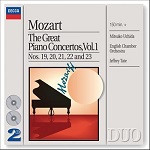
 I
have been singing the praises of Mitsuko Uchida’s recent Decca recordings
of the Mozart piano concertos, directed by herself, as they have been
appearing, but lovers of a good bargain should also be aware of the
virtues of her earlier series with the ECO and Jeffrey Tate. Not only
are they less expensive – around £10 on CD, £7.49 from 7digital.com
– they also fit five concertos on the two CDs. On disc that’s somewhat
inconvenient – you have to change discs between movements in No.19,
as if changing sides of an LP – but downloading solves that problem.
I
have been singing the praises of Mitsuko Uchida’s recent Decca recordings
of the Mozart piano concertos, directed by herself, as they have been
appearing, but lovers of a good bargain should also be aware of the
virtues of her earlier series with the ECO and Jeffrey Tate. Not only
are they less expensive – around £10 on CD, £7.49 from 7digital.com
– they also fit five concertos on the two CDs. On disc that’s somewhat
inconvenient – you have to change discs between movements in No.19,
as if changing sides of an LP – but downloading solves that problem.
The performances need no endorsement from me at this date and the recordings
still sound fine in top-flight mp3. If you must have lossless flac, prestoclassical.co.uk offer that for £9.91, but that’s not much of a saving on the CDs.
A second volume couples Nos. 16, 24-27 (4689182) and a third
Nos. 9, 14, 15, 17, 18 and Rondo in (4733132). There’s also
a Decca Duo of Uchida and Tate in the early concertos, Nos. 5, 6, 8,
11-13 (4738892). The chief competition at this price comes from
Alfred Brendel with the ASMF and Neville Marriner, also on Decca Duos:
19-21, 23 and 24 with Rondos in D and A (4422692) and Nos. 9,
15, 22, 25 and 27 (4425712) – see 2012/24.
Historical Choice
Ludwig van BEETHOVEN (1770-1827)
Piano Concerto No.3 in c minor, Op.37 [33:54]
Piano Concerto No.4 in G, Op.58 [31:38]
Rondo in C, Op.51/1 [4:42]
Artur Schnabel (piano); London Philharmonic Orchestra/Malcolm Sargent
rec. 1933. ADD/mono
NAXOS HISTORICAL 8.110639 [70:14] – from emusic.com (mp3) or stream from Naxos Music Library or Qobuz.

 There’s
a sad story behind my choice of this recording. Almost 50 years ago
I purchased an album containing this performance of the Third Concerto
– it really was an album: five 78 rpm records in a 12"x12"
hardback ‘book’, DB1940-4 – from The Gramophone Exchange in Wardour
Street, London. Hurrying back home with this wonderful purchase, I
dropped the album at the top of the escalator at Piccadilly Circus Station
and chipped one of the precious but fragile discs, so I never got to
hear the whole performance. Until now, that is, when it comes in a
much smaller and more manageable package – taking no physical space
at all as a download.
There’s
a sad story behind my choice of this recording. Almost 50 years ago
I purchased an album containing this performance of the Third Concerto
– it really was an album: five 78 rpm records in a 12"x12"
hardback ‘book’, DB1940-4 – from The Gramophone Exchange in Wardour
Street, London. Hurrying back home with this wonderful purchase, I
dropped the album at the top of the escalator at Piccadilly Circus Station
and chipped one of the precious but fragile discs, so I never got to
hear the whole performance. Until now, that is, when it comes in a
much smaller and more manageable package – taking no physical space
at all as a download.
The performances are all that I always understood them to be – I wouldn’t
rank even my benchmark recordings such as those from Stephen Kovacevich
and Colin Davis (Australian Eloquence 4805946, 4 budget-price
CDs) or, more recently Howard Shelley (Chandos CHAN10695, 4 CDs –
review, review and November
2011/2) more highly – and the recording has come up sounding miraculously
well for its age: you might think it early-1950s LP rather than 1933
78 rpm. Reservations? I note that the 1933 review mentioned that Schnabel
didn’t let the slow movement of No.3 languish; I think he does, but
just a little.
The emusic.com download is the least expensive available. I’ve given
a link to the streamed version from Qobuz but can’t, unfortunately,
give that to Naxos Music Library, as my access to NML comes from the
USA where this recording is not available for copyright reasons.
Pyotr Ilyich TCHAIKOVSKY (1840-1893) The Nutcracker, Op.71
(1891/92)
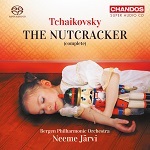 Bergen
Philharmonic Orchestra/Neeme Järvi
Bergen
Philharmonic Orchestra/Neeme Järvi
rec. Grieghallen, Bergen, Norway, 9-12 December 2013. DDD/DSD
pdf booklet included
CHANDOS CHAN5144 [84:35] – from theclassicalshop.net (mp3, 16- and 24-bit lossless and surround). Also available as hybrid
SACD CHSA5144.
Christmas is approaching again: I received my first seasonal CDs for
review in mid-September, by which time one restaurant in Bluewater shopping
centre was already sporting a small Christmas tree and another was advertising
that Christmas would last from 15 October to 23 December – and there
I was thinking it started on 25 December and ran till 6 January.
We weren’t short of recordings of this popular ballet for which my benchmarks
include
• OSR/Ansermet (Decca Eloquence 4800557 or Brilliant Classics 94031,
6 CDs for around £16). One of the oldest but still one of the best.
• NPO/Richard Bonynge (Double Decca E4448272, budget price
–November
2010 – or 4604112, with Sleeping Beauty and Swan
Lake, 6 CDs at budget price). Stream from Qobuz.
• Berlin PO/Simon Rattle (Warner ex EMI 6316212 –
review and Download of the Month, December
2010). NB the edition with the catalogue number listed in
my download review is no longer available, having been replaced on disc
by the Experience Edition, catalogue number as above. Only an abridged
56-minute version now seems to be available for download.
• LSO/André Previn (Warner ex EMI 9676942, 2 CDs at budget
price – review – or 6483772, 6 budget-price CDs with Sleeping Beauty and Swan Lake)
• Bolshoi Orchestra/Alexander Vedernikov (PentaTone PTC5186091 - 2012/22)
• Russian National Orchestra/Mikhail Pletnev (Ondine ODE11802-D – December
2011/2). For those who like slowish tempi.
• Dutch National Ballet/Ermanno Florio (Arthaus blu-ray 108085 or at special reduced price 108087 – review;
DVD 101636)
I’ve had time for just one run-through at the time of writing but the
new recording offers a strong challenge to existing recommendation,
especially as it’s available in 24-bit sound and on SACD. I’ve recently
had the opportunity to compare Chandos’s recording of Mendelssohn Symphonies
Nos. 1 and 3 on SACD and 24-bit download and found that I couldn’t tell
them apart – in which case I’d recommend the download for mp3 and 16-bit
purchase but the SACD (target price £11.50 or less) rather than the
24-bit at £13.99 or the Studio Surround download at £19.99. Though
it runs for over 84 minutes, the SACD seems to be complete on one disc.
Gabriel FAURÉ (1845-1924)
Requiem (reconstruction of 1889 first liturgical performance)
[36:04]
Cantique de Jean Racine [5:43]
Messe basse [9:45]
Gerald Finley (baritone); Tom Pickard (treble)
Choir of King’s College, Cambridge
Orchestra of the Age of Enlightenment/Stephen Cleobury
KING’S COLLEGE KGS0005 [51:33] – from emusic.com (mp3) Also available as SACD.
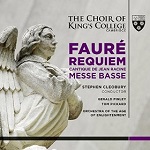 There
already was an EMI recording of the beautiful Fauré Requiem from
King’s and directed by Stephen Cleobury – still available as a download
from 7digital.com. Otherwise, it’s quite a while since King’s recorded the
work, with Sir David Willcocks in command of a version which is still
available and very likeable, if a touch too English-cathedral in style
(Warner/EMI Masters 6230822, mid-price, with Pavane and
Duruflé Requiem, Philip Ledger – review of earlier release). This new performance, a reconstruction of the
first liturgical performance of 1889, courtesy of Marc Rigaudière, captures
the essence of the music much more completely – authentic down even
to repeating the organ stops of the 1889 performance, as recorded in
the score, but beautiful, soothing and refreshing at the same time.
There
already was an EMI recording of the beautiful Fauré Requiem from
King’s and directed by Stephen Cleobury – still available as a download
from 7digital.com. Otherwise, it’s quite a while since King’s recorded the
work, with Sir David Willcocks in command of a version which is still
available and very likeable, if a touch too English-cathedral in style
(Warner/EMI Masters 6230822, mid-price, with Pavane and
Duruflé Requiem, Philip Ledger – review of earlier release). This new performance, a reconstruction of the
first liturgical performance of 1889, courtesy of Marc Rigaudière, captures
the essence of the music much more completely – authentic down even
to repeating the organ stops of the 1889 performance, as recorded in
the score, but beautiful, soothing and refreshing at the same time.
This new version presents a very strong challenge to my previous benchmark,
also from Cambridge, directed by John Rutter, on his own Collegium label
(COLCD109 or CSCD520, with Cantique de Jean Racine, Messe Basse, as from King’s, and other Fauré music – September
2011/2).
The emusic.com download comes in decent mp3 at around 230kb/s. You’re
not likely to get a much better bit-rate from amazon.com and you’ll
pay more from them. To get the full 320kb/s you need to turn to 7digital.com,
but their price of £8.49 exceeds what you are likely to have to pay
for the SACD (£7.46 when I checked, from amazon.co.uk,
which is £0.03 less than they charge for the download and they throw
in the download if you buy the disc!) Don’t be put off by Amazon’s
note that you need an SACD player: as far as I’m aware it’s a hybrid
SACD, with both CD and SACD tracks.
 There’s
another recent recording that certainly deserves to be considered.
I missed the LSO Live release which prefaces the 1893 version of the
Fauré Requiem with music by Bach when it first issued, but John
Quinn greatly enjoyed it –
review – and Simon Thompson – review – and a reviewer for another periodical placed it at the head of the
list. I suggest you try it for yourself if you can, from Naxos Music Library or Qobuz,
to see if the placing of the Bach music first, leading into the Fauré,
works for you. If it does – and it did for me – it’s available from hyperion-records.co.uk in mp3 and 16-bit lossless for rather less (£6.50) than the physical
SACD, or in 24-bit for slightly more (Tenebrae/Nigel Short: LSO0728).
The pdf booklet is part of the deal. Beware of paying more elsewhere
(£7.99 in mp3 from one website; the same for 16-bit lossless from another).
There’s
another recent recording that certainly deserves to be considered.
I missed the LSO Live release which prefaces the 1893 version of the
Fauré Requiem with music by Bach when it first issued, but John
Quinn greatly enjoyed it –
review – and Simon Thompson – review – and a reviewer for another periodical placed it at the head of the
list. I suggest you try it for yourself if you can, from Naxos Music Library or Qobuz,
to see if the placing of the Bach music first, leading into the Fauré,
works for you. If it does – and it did for me – it’s available from hyperion-records.co.uk in mp3 and 16-bit lossless for rather less (£6.50) than the physical
SACD, or in 24-bit for slightly more (Tenebrae/Nigel Short: LSO0728).
The pdf booklet is part of the deal. Beware of paying more elsewhere
(£7.99 in mp3 from one website; the same for 16-bit lossless from another).
The new King’s recording offers rather short value by comparison with
the Rutter, but, as emusic.com charge by the track, their pricing policy
takes care of that. Better value still is to be had from a Hyperion
recording which couples the Fauré with the Duruflé Requiem, a
work very much in the same gentle mould (CDA67070: Corydon Singers;
ECO/Matthew Best). There’s also a recording of the Duruflé on another
Hyperion recording which some will prefer for the distinctive sound
of a Roman Catholic choir (CDA66757, Westminster Cathedral/James
O’Donnell, with Messe Cum jubilo, etc.). Now, just to complicate
matters, along has come yet another recording of the Duruflé on Hyperion,
once again conducted by James O’Donnell in Westminster, but at the Abbey
rather than the Cathedral:
Music for Remembrance
Maurice DURUFLÉ (1902-1986) Requiem, Op.9 (1947)* [37:53]
Ralph VAUGHAN WILLIAMS (1872-1958) Psalm 90: Lord, thou hast
been our Refuge [8:19]
Philip MOORE (b.1943) The Prayers of Dietrich Bonhoeffer [15:11]
Herbert HOWELLS (1892-1983) Take him, earth, for cherishing [8:28]
Sir John TAVENER (1944-2013) The Peace that surpasseth Understanding [5:06]
Christine Rice (mezzo)*; Roderick Williams (baritone)*; David Martin
(counter-tenor)**
Westminster Abbey Choir;
Robert Quinney (organ)
Britten Sinfonia*/James O’Donnell
rec. Westminster Abbey, 4, 5 and 7 February 2013 (Duruflé, Vaughan Williams)
and 4 February 2014 (Tavener) and St Alban’s, Holborn, London, 24 May
2013 (Howells, Moore)
pdf booklet with texts and translations included
HYPERION CDA68020 [74:57] – from hyperion-records.co.uk (mp3, 16- and 24-bit lossless). Free track available on Hyperion October
2014 sampler.
 Westminster
Abbey, with its tomb of the unknown warrior – depicted in the Hyperion
booklet – has long been the centre point of the UK’s remembrance of
the dead of two World Wars and this recording of music from France and
England composed in the shadow of both conflicts is fittingly released
in time for the special remembrance in November 2014, a century after
the first of them. We may have had our fill of special programmes on
television and in history periodicals analysing the causes, progress
and outcomes of that conflict but there is always space for a recording
such as this: the Duruflé was first performed on All Soul’s Day, 1947,
just over a week before Armistice Day, and repeated in the two following
years on that day. I’m indebted to the Hyperion notes for that information:
I’d always thought the work, so similar in mood to the Fauré, though
more closely influenced by plainsong, to have been of much earlier date.
Westminster
Abbey, with its tomb of the unknown warrior – depicted in the Hyperion
booklet – has long been the centre point of the UK’s remembrance of
the dead of two World Wars and this recording of music from France and
England composed in the shadow of both conflicts is fittingly released
in time for the special remembrance in November 2014, a century after
the first of them. We may have had our fill of special programmes on
television and in history periodicals analysing the causes, progress
and outcomes of that conflict but there is always space for a recording
such as this: the Duruflé was first performed on All Soul’s Day, 1947,
just over a week before Armistice Day, and repeated in the two following
years on that day. I’m indebted to the Hyperion notes for that information:
I’d always thought the work, so similar in mood to the Fauré, though
more closely influenced by plainsong, to have been of much earlier date.
Heretofore my first choice for hearing the Duruflé has been the composer’s
own recording: it’s been reissued in various single- and 2-CD combinations
over the years by Erato and Warner, who now own that label, and it’s
currently available at budget price on Warner Apex 2564611392,
withMesse Cum jubilo, Quatre motets and Prélude et
fugue sur le nom d’Alain – review.
I also listened for comparison to a recording which John Quinn made Recording of the Month, from the Vasari Singers/Jeremy
Greenhouse (Signum SIGCD163 – review).
It is a most beautiful recording, though I’m not sure that I’d place
it quite at the top of the tree. William Hedley also liked it but found
the three works by the largely unknown composer Jean-Jacques Grunewald
unmemorable – review – so your take on that recording will depend on how you rate those 22
minutes of Grunewald. I thought his music evocative but I’m not sure
that I’d want to hear it too often, but it’s only a small part of an
otherwise attractive album. Sample it from Qobuz to make your own mind up.
Claude DEBUSSY (1862–1918)
Images pour orchestre, L118 (1905–12) [38:36]
Prélude à l’après-midi d’un faune, L87 (1891–94) [11:23]
La Mer, trois esquisses symphoniques, L111 (1903–05) [25:50]
Singapore Symphony Orchestra/Lan Shui
rec. Esplanade Concert Hall, Singapore, July 2013 (Prélude à l’après-midi
d’un faune); July 2009 (Images) and August 2004 (La Mer)
pdf booklet included
BIS BIS-SACD-1837 [76:48] – from eclassical.com (mp3, 16- and 24-bit lossless)
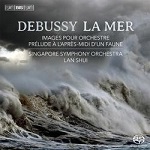

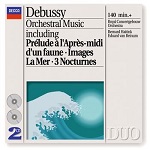 This
recording of La Mer was previously released on ‘Seascapes’ (BIS-SACD-1447)
together with works by Zhou Long, Frank Bridge and Alexander Glazunov.
See review by Dan Morgan: ‘The marvellous instrumental perspectives and textures
… with delectable playing from all quarters, gives the music a jewel-like
sparkle that one rarely finds in more northerly accounts of [La Mer].’
This
recording of La Mer was previously released on ‘Seascapes’ (BIS-SACD-1447)
together with works by Zhou Long, Frank Bridge and Alexander Glazunov.
See review by Dan Morgan: ‘The marvellous instrumental perspectives and textures
… with delectable playing from all quarters, gives the music a jewel-like
sparkle that one rarely finds in more northerly accounts of [La Mer].’
The previous coupling was apt enough but the new all-Debussy album will
probably appeal even more. The opening of Images is very delicate
and though there’s energy, too, where required, this account never dispelled
memories of my benchmark for this work from the LSO and Pierre Monteux
(Decca Eloquence 4806567 or 4768472, the latter download
only). On 4768472 the coupling is the Prélude à l’après midi d’un
faune, plusNuages and Fêtes from Nocturnes (omitting Gigues). Download from prestoclassical.co.uk (mp3 £3.96 or lossless £4.96) or stream from Qobuz.
Alternatively you should consider the Concertgebouw/Bernard Haitink
recordings, also originally from Philips, remain available on a budget
Decca Duo twofer: Images, Jeux, Marche écossaise, Prélude
à l’après midi d’un faune, Nocturnes, La Mer, Première rapsodie and Danses, with Eduard van Beinum’s Berceuse héroïque. (4387422 – from 7digital.com, mp3) * Both of these now classic Debussy recordings
still sound so well – the Monteux especially so in lossless sound, but
the Haitink is still much more than acceptable in mp3 – that I’m loth
to pass them over in favour of the new BIS recording. The 24-bit sound
will clearly appeal to audiophiles and it is very good, but both Monteux
and Haitink retain my affection in Images and Faune, so
my advice would be to sample for yourself: even non-subscribers to Qobuz
can listen to extracts and subscribers can compare all three.
Additional versions to compare include three recently reviewed recordings
which contain La Mer: from Neeme Järvi on Chandos (CHAN9072:
a decent bargain-price recording – 2014/5),
Xavier Roth on Actes Musicales (ASM10: a period-instrument performance
but not especially revelatory – 2014/7)
and the Past Classics very inexpensive reissue of the classic Fritz
Reiner recording (2014/8).
Having sampled all these old and new friends, I returned to the BIS
recording and, though impressed by La Mer, found myself much
less attracted to the other works. Scratching my head and imperilling
what few hairs I have left, I wondered if the fault was mine – then
up popped Dan Morgan’s review,
retaining his love of this La Mer but finding the other works
much less impressive. That reassures me that I’m not alone in finding
this meriting a mixed reception.
* NB: the track containing Jeux is defective, stopping
some 20 seconds short. The fault has been notified and I’m assured
that a replacement will be available in due course. If you just want
Haitink’s Nocturnes and Jeux – the full track – iTunes
have that for an unbelievably inexpensive £1.99. Don’t forget Mark
Elder’s recording of Jeux with some of the Colin Matthews transcriptions
of piano Preludes (CDHLL7518) – review – review – and March
2010 DL Roundup.
Alexander GLAZUNOV (1865-1936) Complete Symphonies
BBC National Orchestra of Wales/Tadaaki Otaka
BIS-CD-1663/4 – from eclassical.com (mp3 and lossless). For details see review.
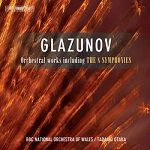 From
time to time eclassical.com offer a specially-priced bundle of recordings
from their associate company BIS. Some of these stay in the catalogue
for a goodly time but others prove to be transitory visitors and need
to be snapped up a.s.a.p. The BIS series of recordings of the Glazunov
symphonies has tended to be overshadowed recently by Serebrier’s recordings
for Warner but they are very fine runners-up – review – along with Chandos’s cycle of Polyansky recordings (also released
in CD format by Brilliant Classics). The five CDs are already available
on disc for the price of two, (BIS-CD-1663/4, around £25), so
I’m pleased to see that eclassical.com are currently offering them in
mp3 and lossless sound for even less, at $20.18. Once the bundle has
been purchased, the constituent CDs can be downloaded separately.
From
time to time eclassical.com offer a specially-priced bundle of recordings
from their associate company BIS. Some of these stay in the catalogue
for a goodly time but others prove to be transitory visitors and need
to be snapped up a.s.a.p. The BIS series of recordings of the Glazunov
symphonies has tended to be overshadowed recently by Serebrier’s recordings
for Warner but they are very fine runners-up – review – along with Chandos’s cycle of Polyansky recordings (also released
in CD format by Brilliant Classics). The five CDs are already available
on disc for the price of two, (BIS-CD-1663/4, around £25), so
I’m pleased to see that eclassical.com are currently offering them in
mp3 and lossless sound for even less, at $20.18. Once the bundle has
been purchased, the constituent CDs can be downloaded separately.
If you are happy with mp3 – though not at the top bit-rate – amazon.co.uk still have this Otaka set for £4.49: see Nick Barnard’s
contribution to June
2011/2.
Ralph VAUGHAN WILLIAMS (1872-1958)
Violin Concerto (1924/5) [18:13]
Sir Edward ELGAR (1857-1934)
Introduction and Allegro Op.47 (1905) [13:50]
Serenade for Strings Op.20 (1892) [10:34]
Ralph VAUGHAN WILLIAMS The Lark Ascending [16:48]
Tamsin Waley-Cohen (violin)
Orchestra of the Swan/David Curtis
rec. St Augustine’s, Kilburn, London, 24 March 2014 (Elgar), Cheltenham
Town Hall, 28 March 2014. DDD
pdf booklet included
SIGNUM SIGCD399 [59:25] – from hyperion-records.co.uk (mp3, 16- and 24-bit lossless)
Sir Edward ELGAR
Variations on an Original Theme (Enigma), Op.36 (1899) [32:46]
In the South (Alassio), Op.50 (1904) [22:52]
Serenade, Op.20 (1892) [11:58]
Philharmonia Orchestra/Sir Andrew Davis
rec. live, Fairfield Hall, Croydon, UK, 18 April 2007 (Enigma); Queen
Elizabeth Hall, London, 19 April 2007 (In the South) and 20 May 2007.
DDD
pdf booklet included
SIGNUM CLASSICS SIGCD168 [66:38] – from hyperion-records.co.uk (mp3, 16- and 24-bit lossless)
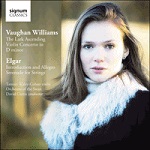
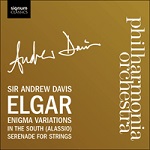 SIGCD399:
This is my first encounter with Tamsin Waley-Cohen, though I note that
Jonathan Woolf recently enjoyed her recording of four sonatas from 1917
on an album of that name – Debussy, Respighi, Sibelius and Elgar – despite
ultimately preferring other versions – review.
Wisely Signum have decided to record her in the VW Violin Concerto rather
than pitch her against established performers in better-known repertoire.
SIGCD399:
This is my first encounter with Tamsin Waley-Cohen, though I note that
Jonathan Woolf recently enjoyed her recording of four sonatas from 1917
on an album of that name – Debussy, Respighi, Sibelius and Elgar – despite
ultimately preferring other versions – review.
Wisely Signum have decided to record her in the VW Violin Concerto rather
than pitch her against established performers in better-known repertoire.
Albion have almost simultaneously released a performance, but in an
arrangement for violin and piano, with other VW works for that combination,
so the competition comes from Yehudi Menuhin (with Boult, 1952, on two
EMI budget boxes), Bradley Creswick, Northern Sinfonia/Richard Hickox
on EMI 2066362, 30 CDs – Bargain of the Month: review – and Kenneth Sillitoe with Bryden Thomson on the alternative Chandos
couplings, and that’s my benchmark for the new release.
Thanks to Classic FM’s Hall of Fame, where it always hovers at or around
the top spot, it now seems mandatory to end with The Lark Ascending whenever possible.
Mp3 and 16-bit flac come at a very reasonable £6.99 and even the top-flight
24-bit costs only £10.50.
Of SIGCD168 William Hedley wrote: ‘There’s really not much to
say about this one. Sir Andrew Davis in an all-Elgar programme ought
to be a safe pair of hands, and so it turns out, and more besides.’
- review.
There’s not much that I can or need to add to that, except to endorse
it.
Recording of the Month
The Fire that breaks from Thee
Gustav HOLST (1874–1934) Overture: Walt Whitman, Op.7
(H42) (1899) [7:43]
Charles Villiers STANFORD (1852–1924)
Violin Concerto No.2 in g minor, Op.162 (1918, realised by Jeremy Dibble,
2011) (1918) [28:54]
Robin MILFORD (1903–1959) Violin Concerto in g minor, Op.47
(1937) [39:06]
Rupert Marshall-Luck (violin)
BBC Concert Orchestra/Owain Arwel Hughes
rec. Watford Colosseum, 7-9 January, 2014. DDD.
No booklet but short notes available from EM Records website
EM RECORDS EMRCD023 [75:45] – from 7digital.com (mp3) or stream from Qobuz
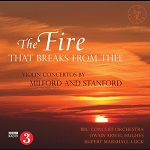
 The
publicity blurb asks us to imagine ‘a work of searing beauty, masterly
orchestration and emotional profundity – one of the greatest violin
concertos to have emerged from these musically fecund shores; only once
– actually, twice – heard and never recorded’. I’m always suspicious
of hype but that’s an apt description of Robin Milford’s Violin Concerto,
composed in 1937 and given two radio broadcasts but laid aside and forgotten
following the early death of its composer and now restored to life by
EM Records. Small as EM may be by comparison with other independent
labels, they have brought us some fine recordings and this is one of
the best.
The
publicity blurb asks us to imagine ‘a work of searing beauty, masterly
orchestration and emotional profundity – one of the greatest violin
concertos to have emerged from these musically fecund shores; only once
– actually, twice – heard and never recorded’. I’m always suspicious
of hype but that’s an apt description of Robin Milford’s Violin Concerto,
composed in 1937 and given two radio broadcasts but laid aside and forgotten
following the early death of its composer and now restored to life by
EM Records. Small as EM may be by comparison with other independent
labels, they have brought us some fine recordings and this is one of
the best.
The companion piece is also ground-breaking: Stanford’s Second Violin
Concerto. Composed in 1918, yet left only in a short-score form upon
the composer’s death in 1924, it was finally completed in 2011 by Stanford
scholar Jeremy Dibble, whose reconstruction sounds wholly convincing.
This fine performance brings us another step along the road of dispelling
the idea that Stanford was a stodgy stick-in-the-mud.
There are several other recordings of Holst’s Walt Whitman Overture
which opens proceedings but this is as good as any. The mp3 transfer
(at the full 320kb/s from 7digital) sounds fine.
Dances
Johann Sebastian BACH (1685-1750) Partita No.4, BWV828 [17:45]
Frédéric CHOPIN (1810-1849) Andante spianato et grande polonaise
brillante in E-flat, Op.22 [12:58]
Polonaise No.5 in f sharp Minor Op.44 [10:24]
Alexander SCRIABIN (1872-1915) Ten Mazurkas Op.3/6, 4 and 9 [8:59]
Valse in A flat, Op.38 [5:38]
Enrique GRANADOS (1867-1917) Valses Poeticos [10:30]
Adolf SCHULZ-EVLER (1852-1905) Concert Arabesques on themes by
Johann Strauss, An der schönen blauen Donau [10:02]
Isaac ALBÉNIZ (1860-1909) arr. Leopold Godowsky Tango,
Op.165/2 [2:39]
Morton GOULD (1913-1996) Boogie Woogie Etude [2:07]
Benjamin Grosvenor (piano)
DECCA 4785334 [81:07] – from 7digital.com (mp3) or stream from Qobuz (with booklet)
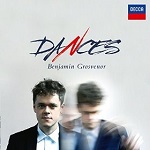 I’m
normally resistant to hype, so I’ve kept this album at arm’s length
for some time, but I eventually succumbed to Benjamin Grosvenor’s earlier
album of Saint-Saëns, Ravel and Gershwin*, which I liked rather better
than Dan Morgan – September
2012/2 – and I have to admit that its successor is also very good.
I’m
normally resistant to hype, so I’ve kept this album at arm’s length
for some time, but I eventually succumbed to Benjamin Grosvenor’s earlier
album of Saint-Saëns, Ravel and Gershwin*, which I liked rather better
than Dan Morgan – September
2012/2 – and I have to admit that its successor is also very good.
I could have done without the Bach – performances on the piano have
to be exceptional and this one is not. Even in Bach the playing is
extremely good, but the style is too ‘feminine’ for my liking. That
quality appropriately inspires his Chopin, though there’s plenty of
power, too, in the Andante spianato and the rest of the programme
goes very well indeed. The mp3 download, at the full 320kb/s, is good,
but the stereo spread is very wide – it’s almost as if right and left
hands inhabited separate channels.
If you plan to burn the music to CD, because the programme runs to over
80 minutes you’ll need two blank CD-Rs or settle for using iTunes to
burn as an mp3 disc, in which case I recommend using a joining programme
for the Granados Valses to avoid hiatuses between sections.
* If you want just the Gershwin from that album, Qobuz have it for £1.81.
In brief
Every month there’s so much new material that I feel like Zeno’s frog
trying to keep up with it – if he doesn’t leap at least half way up
the well first time, he won’t get to the top. In an attempt to leap
a little higher, I’m going to give less full details of some recordings,
though that doesn’t mean that some in that category won’t receive accolades.
 There’s
a selection of VIVALDI flute and recorder concertos on a new
Harmonia Mundi album. RV443, 439 (La Notte), 95 (La Pastorella),
566, 375, 103 and 90 (Il Gardellino) are played by Maurice Steger
(recorder, flauto dolce and flautino) with I Barrochisti/Diego Fasolis
on HMC902190 [67:58], recorded in January, March and April 2014.
Period instruments, meantone temperament and baroque pitch (A=416Hz)
guarantee authenticity, though purists may object to the ‘borrowing’
of RV375 from the violin.
There’s
a selection of VIVALDI flute and recorder concertos on a new
Harmonia Mundi album. RV443, 439 (La Notte), 95 (La Pastorella),
566, 375, 103 and 90 (Il Gardellino) are played by Maurice Steger
(recorder, flauto dolce and flautino) with I Barrochisti/Diego Fasolis
on HMC902190 [67:58], recorded in January, March and April 2014.
Period instruments, meantone temperament and baroque pitch (A=416Hz)
guarantee authenticity, though purists may object to the ‘borrowing’
of RV375 from the violin.
Some of these concertos were published in the Op.10 set but, like Frans
Brüggen on a SEON recording which I remember affectionately from long
ago, the performers have gone back to the originals. None of which
would amount to the proverbial hill of beans if the performances weren’t
enjoyable, but they are. Fast movements are taken furiously – the recording
of RV443 which completes the ASMF recording of La Cetra, Op.9
(Decca) creaks by comparison, 10:58 against 9:56. Some of the tempi
and the degree of rubato employed will not be to all tastes,
however – sample the end of the first movement of RV443 if you can,
from Qobuz or Naxos
Music Library. Slow movements go beautifully, often with accompaniment
reduced to one or two members of the lute family and the salterio.
The recording, more than acceptable in mp3, is even better in 24-bit.
I see that Johan van Veen disliked Steger’s earlier recording of Il
Gardellino, with the same forces, on Claves – review – but I think the new recording would be a little more to his liking.
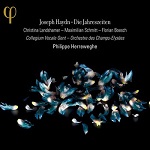
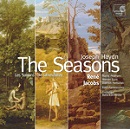
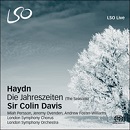 Joseph
HAYDN Die Jahreszeiten (The Seasons, HobXXI:3) is less often
performed and recorded than The Creation but a new recording
directed by Philippe Herreweghe makes a very strong case for it. (Outhere
PHI LPH013 - rec. March 2013 [65:40 + 63:37]). The soloists are
Christina Landshamer (soprano) – Hanne; Maximilian Schmitt (tenor)
– Lukas; Florian Boesch (bass) – Simon; and the Collegium
Vocale Gent are accompanied by the Orchestre des Champs-Elysées. 7digital.com have it in mp3 for £7.99, with pdf booklet: their 320kb/s bit-rate trumps
the barely adequate 192kb/s of the press download which I obtained from
Outhere, though even that sounds fine. Watch out for a forthcoming Creation from the same source.
Joseph
HAYDN Die Jahreszeiten (The Seasons, HobXXI:3) is less often
performed and recorded than The Creation but a new recording
directed by Philippe Herreweghe makes a very strong case for it. (Outhere
PHI LPH013 - rec. March 2013 [65:40 + 63:37]). The soloists are
Christina Landshamer (soprano) – Hanne; Maximilian Schmitt (tenor)
– Lukas; Florian Boesch (bass) – Simon; and the Collegium
Vocale Gent are accompanied by the Orchestre des Champs-Elysées. 7digital.com have it in mp3 for £7.99, with pdf booklet: their 320kb/s bit-rate trumps
the barely adequate 192kb/s of the press download which I obtained from
Outhere, though even that sounds fine. Watch out for a forthcoming Creation from the same source.
If you must have lossless sound (24-bit, even), eclassical.com have the recording directed by René Jacobs with Werner Güra, Dietrich
Henschel, Marlis Petersen, the RIAS Kammerchor and Freiburger Barockorchester
(HARMONIA MUNDI HMC901829/30 [124:40], no booklet). Simon Thompson
reviewed this recently with a new mid-price catalogue number and was
thoroughly convinced – review.
Those in search of an English-texted version will find one with period
instruments on the Lyrichord label (LEMS8071 – review)
but Colin Davis, with modern instruments, is less expensive (Philips
Duo 4640342 – reviewed September
2010, with John Eliot Gardiner, DG Archiv). More recently, in 2010,
Davis recorded the work in German and that, too, is well worth considering:
Davis’s way with Haydn eschewed the ‘authentic’ but, as with the recent
LSO Live release of several of the London symphonies – 2014/9 – it was always appealing. Download from hyperion-records.co.uk (LSO Live LSO0708 [128:35], mp3, 16- and 24-bit lossless, with
pdf booklet).
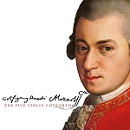 All
five authentic MOZART Violin Concertos for £2.10 has to count
as a bargain, especially when these are the performances by Arthur
Grumiaux, the LSO and Colin Davis, still among the very best unless
you are looking for period performance practice. The sound, from the
early 1960s, is bright and upfront but the treble needs taming somewhat
by comparison with the Decca Duo (4383232) or Philips 50 (45647222)
2-CD sets of these performances, both at budget price. On the Decca
the Sinfonia Concertante, a Rondo and Adagio form
the coupling; on the Philips it’s the Violin Sonatas Nos. 32 and 35,
with Clara Haskil. The Past Classics download from emusic.com contains just the concertos.
All
five authentic MOZART Violin Concertos for £2.10 has to count
as a bargain, especially when these are the performances by Arthur
Grumiaux, the LSO and Colin Davis, still among the very best unless
you are looking for period performance practice. The sound, from the
early 1960s, is bright and upfront but the treble needs taming somewhat
by comparison with the Decca Duo (4383232) or Philips 50 (45647222)
2-CD sets of these performances, both at budget price. On the Decca
the Sinfonia Concertante, a Rondo and Adagio form
the coupling; on the Philips it’s the Violin Sonatas Nos. 32 and 35,
with Clara Haskil. The Past Classics download from emusic.com contains just the concertos.
 If
you don’t wish to run to the full-price Benjamin Grosvenor Dances album (above), but are looking for the Andante Spianato and Grande
Polonaise Brillante as part of a basic CHOPIN collection,
my Bargain of the Month is Sony Classical 50 Best
Chopin Classical Masterieces – not a rag-tag collection from
players whom you have never heard of, but including Rubinstein, Perahia,
Kissin, Horowitz, Serkin, Graffman, Entremont and Ax. Van Cliburn and
Ormandy offer an attractive account of the Romanze
If
you don’t wish to run to the full-price Benjamin Grosvenor Dances album (above), but are looking for the Andante Spianato and Grande
Polonaise Brillante as part of a basic CHOPIN collection,
my Bargain of the Month is Sony Classical 50 Best
Chopin Classical Masterieces – not a rag-tag collection from
players whom you have never heard of, but including Rubinstein, Perahia,
Kissin, Horowitz, Serkin, Graffman, Entremont and Ax. Van Cliburn and
Ormandy offer an attractive account of the Romanze 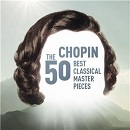 second
movement of the First Piano Concerto. I might have preferred Rubinstein
in the concerto but we have the last half of his performance of Fantasy
on Polish Airs with Ormandy – would that we had the rest, now imprisoned
in an 11-CD set, but that’s my only regret, apart from the lack of documentation:
does the Graffman Andante Spianato and Grande Polonaise come
from his RCA or CBS recording?
second
movement of the First Piano Concerto. I might have preferred Rubinstein
in the concerto but we have the last half of his performance of Fantasy
on Polish Airs with Ormandy – would that we had the rest, now imprisoned
in an 11-CD set, but that’s my only regret, apart from the lack of documentation:
does the Graffman Andante Spianato and Grande Polonaise come
from his RCA or CBS recording?
The recording quality is never less than very acceptable and the performances
are all that you might expect from such luminaries. The cover is rather
gash, but you don’t have to look at it – this is a download album –
and the price is right: £2.99 from sainsburysentertainment.co.uk (320kb/s mp3) or £3.49 in lossless
sound from Qobuz,
from whom the album can also be streamed.
The playing time is 4:41:10.
Supplement this bargain set with the Piano Concertos – Argerich and
Dutoit (Warner/EMI 5034122: around £6.50 on CD or £4.99 in mp3
from sainsburysentertainment.co.uk ) or Rubinstein with Skrowaczewski
and Wallenstein (Sony/RCA – November
2010 DL Roundup) and you have the makings of a fine Chopin collection.
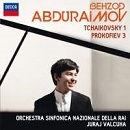 Behzod
Abduraimov is the latest young pianist to tackle TCHAIKOVSKY’s
Piano Concerto No.1, with the RAI Symphony Orchestra conducted by Juraj
Valucha (Decca 4785360, rec. July 2013). If the coupling appeals
– a vigorous PROKOFIEV Piano Concerto No.3, placed first on the
recording – this is well worth considering. This is only his second
recording and the first in concertos. I reviewed his first album in 2012/20:
that featured a Prokofiev sonata and his performance of the concerto
is equally impressive, while the Tchaikovsky is one of the best that
I’ve heard. I listened to this streamed in excellent, CD-quality, sound
from Qobuz,
where you can also read the booklet and buy the album as a 16- or 24-bit
lossless download. (NB: UK readers may well find the CD on offer
for less than the Qobuz 16-bit price). Otherwise the least expensive
download in top-quality mp3 is from 7digital.com.
Behzod
Abduraimov is the latest young pianist to tackle TCHAIKOVSKY’s
Piano Concerto No.1, with the RAI Symphony Orchestra conducted by Juraj
Valucha (Decca 4785360, rec. July 2013). If the coupling appeals
– a vigorous PROKOFIEV Piano Concerto No.3, placed first on the
recording – this is well worth considering. This is only his second
recording and the first in concertos. I reviewed his first album in 2012/20:
that featured a Prokofiev sonata and his performance of the concerto
is equally impressive, while the Tchaikovsky is one of the best that
I’ve heard. I listened to this streamed in excellent, CD-quality, sound
from Qobuz,
where you can also read the booklet and buy the album as a 16- or 24-bit
lossless download. (NB: UK readers may well find the CD on offer
for less than the Qobuz 16-bit price). Otherwise the least expensive
download in top-quality mp3 is from 7digital.com.
There’s a highly appreciative review of a live performance by Abduraimov
of the Tchaikovsky from Seen and Heard reviewer Margarida Mota-Bull here.
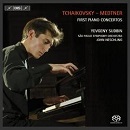
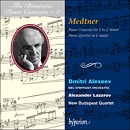
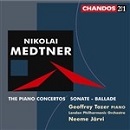 After
Abduraimov, Yevgeny Sudbin on BIS may sound a little tame, though
it’s by no means to be overlooked, especially as it’s available in 24-bit
sound, as well as mp3 and 16-bit, and comes with MEDTNER’s First
Piano Concerto, Op.33 (BIS-SACD-1588, with São Paulo Symphony
Orchestra/John Neschling – rec. 2006 – download with pdf booklet from eclassical.com or stream from Naxos Music Library or Qobuz).
For full details see review by Christopher Howell.
After
Abduraimov, Yevgeny Sudbin on BIS may sound a little tame, though
it’s by no means to be overlooked, especially as it’s available in 24-bit
sound, as well as mp3 and 16-bit, and comes with MEDTNER’s First
Piano Concerto, Op.33 (BIS-SACD-1588, with São Paulo Symphony
Orchestra/John Neschling – rec. 2006 – download with pdf booklet from eclassical.com or stream from Naxos Music Library or Qobuz).
For full details see review by Christopher Howell.
Those looking for an all-MEDTNER programme will be well served
by the First Piano Concerto and Piano Quintet in C, Op. posth., performed
by Dmitri Alexeev with the BBCSO/Alexander Lazarev and the New
Budapest Quartet (Hyperion CDA66744 – mp3 and lossless from hyperion-records.co.uk,
with pdf booklet). Because the album is just under an hour long, the
price of the download is reduced to £6.99 in both formats. See Tony
Haywood’s review for full details.
Hyperion also offer Alexeev in the Second and Third Piano Concertos,
but those in search of a bargain will find the Chandos recordings of
all three concertos now at reduced price on a two-for-one album (CHAN241-25: Geoffrey Tozer, LPO/Neeme Järvi – from theclassicalshop.net,
mp3 and lossless; pdf booklet available). Be sure to choose the right
download – Chandos still offer the earlier full-price twofer and the
website will take you there first.
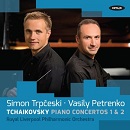 If
you want the TCHAIKOVSKY with his second concerto, there’s a
new recording from Simon Trpčeski with the Royal Liverpool
Philharmonic Orchestra/Vasily Petrenko (Onyx ONYX4135 [70:49]
– from eclassical.com,
mp3 and lossless). Two Tchaikovsky piano concertos on one CD – looks
like a real bargain, but it’s achieved at the expense of making the
disfiguring Alexander Siloti cuts in the slow movement of the second.
My benchmark, the Hyperion recording of all three concertos plus Concert
Fantasia plays without the cuts but with the Siloti version as an
alternative should you prefer it (Stephen Hough/Minnesota SO/Osmo Vänskä: CDA67711/2).
The Hyperion even comes at an attractive price – £20 direct on CD or
£15.49 as an mp3 or lossless download.
If
you want the TCHAIKOVSKY with his second concerto, there’s a
new recording from Simon Trpčeski with the Royal Liverpool
Philharmonic Orchestra/Vasily Petrenko (Onyx ONYX4135 [70:49]
– from eclassical.com,
mp3 and lossless). Two Tchaikovsky piano concertos on one CD – looks
like a real bargain, but it’s achieved at the expense of making the
disfiguring Alexander Siloti cuts in the slow movement of the second.
My benchmark, the Hyperion recording of all three concertos plus Concert
Fantasia plays without the cuts but with the Siloti version as an
alternative should you prefer it (Stephen Hough/Minnesota SO/Osmo Vänskä: CDA67711/2).
The Hyperion even comes at an attractive price – £20 direct on CD or
£15.49 as an mp3 or lossless download.
Apart from these, my most recent encounter with No.1 came from Ingolf
Wunder and Vladimir Ashkenazy (DG 4790670, with Chopin – 2014/10).
I liked Wunder’s Chopin but was less impressed with his Tchaikovsky
– others have scored it the other way around – leaving me with Hough
and Vänskä still top of the tree. That remains the case after hearing
Trpceski and Petrenko: had I heard these performances live or on a broadcast
I’d have gladly joined in the applause. There’s certainly nothing much
amiss, but that’s true of at least half the 60+ recordings of this work
currently on offer. Overall I was disappointed with this Onyx recording
and I see that my colleague Simon Thompson has been even less impressed
– review.
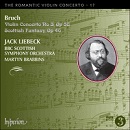 Of
the two violin concertante works by Max BRUCH on Hyperion CDA68050 [69:35], the Scottish Fantasy in E-flat [31:00]
receives more outings than Violin Concerto No.3 in d minor, Op.58
[38:35]. The soloist is Jack Liebeck, with the BBC Scottish
SO and Martyn Brabbins. The concerto doesn’t have the immediate appeal
of the ubiquitous No.1 but I wonder if part of my failure to engage
with this performance concerns the rhapsodic manner and tempo adopted
for the allegro energico first movement. Perhaps a combination
of a Heifetz and Reiner, who showed us how the first movement of the
Brahms should be taken, could have made more of it. The fact that Chloë
Hanslip, also with Martyn Brabbins (Warner) and Salvatore Accardo with
Kurt Masur (Double Decca) take slightly longer suggests only that, though
there are few recordings, there’s an ‘agreed’ standard tempo – but so
there is for the Brahms till you hear Heifetz.
Of
the two violin concertante works by Max BRUCH on Hyperion CDA68050 [69:35], the Scottish Fantasy in E-flat [31:00]
receives more outings than Violin Concerto No.3 in d minor, Op.58
[38:35]. The soloist is Jack Liebeck, with the BBC Scottish
SO and Martyn Brabbins. The concerto doesn’t have the immediate appeal
of the ubiquitous No.1 but I wonder if part of my failure to engage
with this performance concerns the rhapsodic manner and tempo adopted
for the allegro energico first movement. Perhaps a combination
of a Heifetz and Reiner, who showed us how the first movement of the
Brahms should be taken, could have made more of it. The fact that Chloë
Hanslip, also with Martyn Brabbins (Warner) and Salvatore Accardo with
Kurt Masur (Double Decca) take slightly longer suggests only that, though
there are few recordings, there’s an ‘agreed’ standard tempo – but so
there is for the Brahms till you hear Heifetz.
The Scottish Fantasy is, for me, almost preferable to the Violin
Concerto No.1. Here, too, the approach is mostly rhapsodic by comparison
with Accardo/Masur but the music can take it, as on my benchmark recording
from David Oistrakh/Jascha Horenstein (Decca). The 24-bit sound is
excellent but the mp3 also sounds fine. From hyperion-records.co.uk (mp3, 16- and 24-bit lossless, with pdf booklet).
For Nicola Benedetti’s Homecoming album, which includes the Scottish
Fantasy, see review and DL News 2014/9.
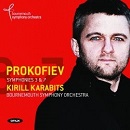 Dave
Billinge liked most things about PROKOFIEV Symphonies Nos. 3
and 7, the first release of a planned cycle (ONYX4137: Bournemouth
SO/Kirill Karabits [65:08] - from emusic.com (mp3 and lossless) but not the recording – a ‘hole in the middle affair’: review.
John Quinn also liked the performances; he thought the recording appropriately
bright but less appropriately over-close – review.
Certainly the left-right separation is somewhat extreme – that seems
to be coming back into fashion, as on the Decca Benjamin Grosvenor Dances album, above – and the up-front sound suits the brutal Third. The Seventh
is a work more to my liking and it receives a fittingly more placid
performance, if a little strident by comparison with the Walter Weller
performance* from which I got to know the work many years ago, newly
reissued by Decca with the complete symphonies, Russian Overture,Scythian
Suite and Love for three Oranges Suite: 4786475 (4CDs
at budget price – review of Nos. 1 and 5).
Dave
Billinge liked most things about PROKOFIEV Symphonies Nos. 3
and 7, the first release of a planned cycle (ONYX4137: Bournemouth
SO/Kirill Karabits [65:08] - from emusic.com (mp3 and lossless) but not the recording – a ‘hole in the middle affair’: review.
John Quinn also liked the performances; he thought the recording appropriately
bright but less appropriately over-close – review.
Certainly the left-right separation is somewhat extreme – that seems
to be coming back into fashion, as on the Decca Benjamin Grosvenor Dances album, above – and the up-front sound suits the brutal Third. The Seventh
is a work more to my liking and it receives a fittingly more placid
performance, if a little strident by comparison with the Walter Weller
performance* from which I got to know the work many years ago, newly
reissued by Decca with the complete symphonies, Russian Overture,Scythian
Suite and Love for three Oranges Suite: 4786475 (4CDs
at budget price – review of Nos. 1 and 5).
* I happily reacquainted myself with Weller’s performance from Qobuz.
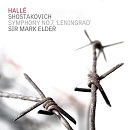
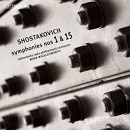 John
Quinn is far from alone in thinking the Hallé recording of SHOSTAKOVICH Symphony No.7 (Leningrad: CDHLL7537 :
Hallé/Sir Mark Elder [76:19]) ‘another excellent addition to
the Hallé label’s series of live performances that shows what an asset
the orchestra is to the city of Manchester.’ See review.
The emusic.com download comes at a variable bit-rate of around 200kb/s – only just
adequate, but good value at £1.68. The low bit-rate may explain the
need to turn the volume well up to avoid some passages, such as the
start of that inexorable march in the first movement, becoming inaudible.
John
Quinn is far from alone in thinking the Hallé recording of SHOSTAKOVICH Symphony No.7 (Leningrad: CDHLL7537 :
Hallé/Sir Mark Elder [76:19]) ‘another excellent addition to
the Hallé label’s series of live performances that shows what an asset
the orchestra is to the city of Manchester.’ See review.
The emusic.com download comes at a variable bit-rate of around 200kb/s – only just
adequate, but good value at £1.68. The low bit-rate may explain the
need to turn the volume well up to avoid some passages, such as the
start of that inexorable march in the first movement, becoming inaudible.
There’s a feeling of déjà-vu about Mark Wigglesworth’s recording
of the alpha and omega of SHOSTAKOVICH symphonies, Nos. 1 and
15 (BIS BIS-SACD-1643 [79:15]). We have already had No.1, coupled
with Nos. 2 and 3. The fact, however, that many other recordings of
No.15, including Haitink’s highly regarded account with the Concertgebouw
Orchestra on their own label – review – come without any filler makes the duplication seem less of a problem.
Dan Morgan thought this ‘a fitting end to this fine cycle’ – review – and John Quinn was, if anything, even more enthusiastic – review.
No.15 compares very favourably with my recent benchmark from the RLPO
and Petrenko on Naxos - DL
Roundup July 2012. The recording is very good, especially in 24-bit
format from eclassical.com. The download is unavailable as I write
– temporarily, I am assured – but meanwhile prestoclassical.co.uk offer it in mp3 and 16-bit.
Music by Martin BUSSEY (b. 1958) Through a Glass and other
Songs is performed by Marcus Farnsworth (baritone) with James Baillieu
(piano), Sasha Calin (oboe), Lorna West (bassoon), Graham South (trumpet),
Jamie Campbell (violin), Robin Ashwell (viola) and Cara Berridge (cello)
directed by Thomas Kemp on RESONUS CLASSICS RES10137 [68:25]
– from resonusclassics.com (mp3, 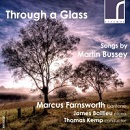 aac,
16- and 24-bit lossless with pdf booklet of texts) or eclassical.com (mp3, 16- and 24-bit lossless, no booklet).
aac,
16- and 24-bit lossless with pdf booklet of texts) or eclassical.com (mp3, 16- and 24-bit lossless, no booklet).
These are all world premiere recordings, made in the presence of the
composer, who is also a singer, lecturer and conductor. The music is
in the mainstream of 20th-century English song –When I
was in love with you and the other Housman poems which open the
programme is reminiscent of the settings by Vaughan Williams (On
Wenlock Edge) and Ivor Gurney (Ludlow and Teme and The
Western Playland) and the title sequence, Through a Glass,
is often as impassioned as Benjamin Britten’s War Requiem. I
enjoyed hearing it: the performances must be regarded as authoritative
and the recording is very good, especially in 24/96 format.
The booklet claims that this album was recorded within days of its appearance,
which must be a record – unless, as I assume, for 2014 read 2013. That
booklet doesn’t come with the eclassical.com download but is available
free from the resonusclassics.com webpage.
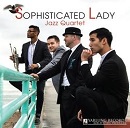 On
my Jazz Choice, Sophisticated Lady, the jazz quartet
of that name (webpage)
perform their own instrumental takes on such classics as Jerome KERN’s You were never lovelier, Duke ELLINGTON’s Isfahan and Sophisticated Lady, Abel MEEROPOL’s Strange Fruit and Misha Bigos’s Fields of Kurdistan. The mood is one of reflection
– a supplement to my favourite Late-Night Brubeck, perhaps –
recorded by Yarlung Records (YAR65004 [65:25]) and sounding well
in mp3, 16- and 24-bit lossless from eclassical.com.
On
my Jazz Choice, Sophisticated Lady, the jazz quartet
of that name (webpage)
perform their own instrumental takes on such classics as Jerome KERN’s You were never lovelier, Duke ELLINGTON’s Isfahan and Sophisticated Lady, Abel MEEROPOL’s Strange Fruit and Misha Bigos’s Fields of Kurdistan. The mood is one of reflection
– a supplement to my favourite Late-Night Brubeck, perhaps –
recorded by Yarlung Records (YAR65004 [65:25]) and sounding well
in mp3, 16- and 24-bit lossless from eclassical.com.
Betty Roché became famous with her cover version of the Duke
ELLINGTON/Billy STRAYHORN Take the A-train and that’s the
title song of a reissue on Bethlehem Records. In the absence of documentation,
I take this to be not the 1943 recording with Duke Ellington but a recording
which she made in 1956. Other tracks include Something to live for, Route 66, Go away blues and September in the rain.
The re-mastering is very effective. (BCP64 [41:53] – from eclassical.com,
mp3, 16- and 24-bit lossless or stream from Qobuz.)
If you are unwilling to invest almost £100 in the Complete RCA Collection
of Julian Bream recordings – especially if, like me, you bought
some of them when they were last available singly – you may be interested
in some of the individual albums as downloads. It goes almost without
saying that I recommend snapping up any that you don’t already own.
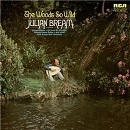 Though
short on playing time, 40-50 minutes, reflecting the contents of the
original LPs, they are inexpensive: The Woods so Wild, lute music
by Tudor composers, for example, is just £4.49 in 320kb/s mp3 from 7digital.com.
(Even less, £3.99, still at 320 kb/s, from Sainsburys – see below for
details). The original LP was a great favourite and I’m very pleased
to have it available again in a good transfer. It’s the same price
for Elizabethan
Lute Songs, but the snag here is the voice of Peter Pears: though
I got to know this repertoire from an earlier Bream/Pears recording
on a 10" Decca, I can take his voice only in Britten’s music.
Pears also features in Julian
Bream in Concert, recorded in Wellesley Hall, Massachusetts, Town
Hall New York and the Wigmore Hall, London.
Though
short on playing time, 40-50 minutes, reflecting the contents of the
original LPs, they are inexpensive: The Woods so Wild, lute music
by Tudor composers, for example, is just £4.49 in 320kb/s mp3 from 7digital.com.
(Even less, £3.99, still at 320 kb/s, from Sainsburys – see below for
details). The original LP was a great favourite and I’m very pleased
to have it available again in a good transfer. It’s the same price
for Elizabethan
Lute Songs, but the snag here is the voice of Peter Pears: though
I got to know this repertoire from an earlier Bream/Pears recording
on a 10" Decca, I can take his voice only in Britten’s music.
Pears also features in Julian
Bream in Concert, recorded in Wellesley Hall, Massachusetts, Town
Hall New York and the Wigmore Hall, London.
Another pairing brings together Bream with Peggy Ashcroft in Two Loves, a sequence of DOWLAND’s music and Shakespeare’s
poetry. He teams up with the members of the Bream Consort in An
Evening of Elizabethan Music.
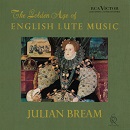 I
regularly listen with enjoyment to the earlier CD reincarnation of The Golden Age of Elizabethan Music ; for those who didn’t
acquire it I suggest snapping it up now, again at £4.49. (NB: one dealer
still has the original CD for £5.00, if you prefer). Dances
of Dowland features two pieces from the Lachrimæ collection
and ends with the ubiquitous Semper Dowland semper dolens, but
the rest of the collection consists of lively music. Some of the other Lachrimæ pieces feature on the companion album Lute
Music of John Dowland.
I
regularly listen with enjoyment to the earlier CD reincarnation of The Golden Age of Elizabethan Music ; for those who didn’t
acquire it I suggest snapping it up now, again at £4.49. (NB: one dealer
still has the original CD for £5.00, if you prefer). Dances
of Dowland features two pieces from the Lachrimæ collection
and ends with the ubiquitous Semper Dowland semper dolens, but
the rest of the collection consists of lively music. Some of the other Lachrimæ pieces feature on the companion album Lute
Music of John Dowland.
iTunes and Amazon UK have a larger selection: prices vary, with sometimes
one, sometimes the other slightly less expensive. I’ve limited my list
to albums under £4.50. From these suppliers, however, they also come
at a lower bit-rate (around 256kb/s).
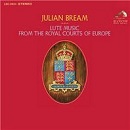 Music
from around the same period as the Dowland features on Lute Music
from the Royal Courts of Europe - £3.99 from iTunes/£4.49 from Amazon UK. Returning to England, Elizabethan and Jacobean Consort Music
from the Julian Bream Consort features on Fantasies, Ayres and Dances - £3.99 from iTunes/£4.49 from Amazon.
Music
from around the same period as the Dowland features on Lute Music
from the Royal Courts of Europe - £3.99 from iTunes/£4.49 from Amazon UK. Returning to England, Elizabethan and Jacobean Consort Music
from the Julian Bream Consort features on Fantasies, Ayres and Dances - £3.99 from iTunes/£4.49 from Amazon.
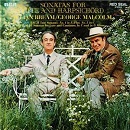 Another
favourite LP of mine, trio sonatas by BACH and sonatas by VIVALDI arranged for lute and harpsichord features the original sleeve with
John Bream and George Malcolm sitting on a bench in a field surrounded
by tall grasses and flowers. Not quite authentic but a must-have for
£3.99 from sainsburysentertainment.co.uk or iTunes. More arrangements of
Bach Trio Sonatas and the ‘lute’ Suite, BWV996 are available for £4.49
from Amazon.
Another
favourite LP of mine, trio sonatas by BACH and sonatas by VIVALDI arranged for lute and harpsichord features the original sleeve with
John Bream and George Malcolm sitting on a bench in a field surrounded
by tall grasses and flowers. Not quite authentic but a must-have for
£3.99 from sainsburysentertainment.co.uk or iTunes. More arrangements of
Bach Trio Sonatas and the ‘lute’ Suite, BWV996 are available for £4.49
from Amazon.
Music by TÁRREGA, PUJOL and LLOBET, his last RCA
recording from 1991, comes on an album entitled La Guitarra Romantica – iTunes £3.99/ Amazon £4.49. Music of Spain: Volume 5 features works by GRANADOS (Valsas poéticos, etc) and ALBENIZ (Suite Española)
- £3.99 from iTunes/£4.49 from Amazon.
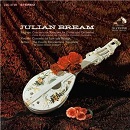 RODRIGO Concierto de Aranjuez (with Colin Davis) BRITTEN Courtly
Dances from Gloriana and VIVALDI Lute Concerto RV93 costs
£3.99 from iTunes and from Sainburys – see link below. The alternative
recording of the Rodrigo, with John Eliot Gardiner, coupled with the Lennox BERKELEY Concerto, Op.8, my own preferred coupling, is
also available for £3.99 (£4.49 from Amazon UK). Yet another combination
of Bream in the Rodrigo, with the Fantasia para un gentilhombre,
both with Gardiner, costs £4.49 from Amazon.
RODRIGO Concierto de Aranjuez (with Colin Davis) BRITTEN Courtly
Dances from Gloriana and VIVALDI Lute Concerto RV93 costs
£3.99 from iTunes and from Sainburys – see link below. The alternative
recording of the Rodrigo, with John Eliot Gardiner, coupled with the Lennox BERKELEY Concerto, Op.8, my own preferred coupling, is
also available for £3.99 (£4.49 from Amazon UK). Yet another combination
of Bream in the Rodrigo, with the Fantasia para un gentilhombre,
both with Gardiner, costs £4.49 from Amazon.
 Another
very fine 20th-century concerto, by VILLA-LOBOS, with
André Previn as conductor, costs £3.69 from Amazon UK and £3.99 from
iTunes; it’s coupled with 5 Preludes and Suite populaire brésilienne.
Alternatively the 12 Etudes are coupled with Suite populaire
brésilienne for £3.99 from sainsburysentertainment.co.uk or iTunes.
Another
very fine 20th-century concerto, by VILLA-LOBOS, with
André Previn as conductor, costs £3.69 from Amazon UK and £3.99 from
iTunes; it’s coupled with 5 Preludes and Suite populaire brésilienne.
Alternatively the 12 Etudes are coupled with Suite populaire
brésilienne for £3.99 from sainsburysentertainment.co.uk or iTunes.
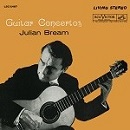 The
Guitar Concerto by Richard Rodney BENNETT and 5 Bagatelles by William WALTON are recorded on Julian Bream 70s, with
short works by Lennox BERKELEY and Alan RAWSTHORNE as
fillers: £3.99 from iTunes/£4.49 from Amazon. All the music was composed specially for Bream, as was
the Concerto by Malcolm ARNOLD, coupled with Mauro GIULIANI on another £3.99 iTunes offering - £4.49 from Amazon.
The
Guitar Concerto by Richard Rodney BENNETT and 5 Bagatelles by William WALTON are recorded on Julian Bream 70s, with
short works by Lennox BERKELEY and Alan RAWSTHORNE as
fillers: £3.99 from iTunes/£4.49 from Amazon. All the music was composed specially for Bream, as was
the Concerto by Malcolm ARNOLD, coupled with Mauro GIULIANI on another £3.99 iTunes offering - £4.49 from Amazon.
UK readers may prefer to download where possible from sainsburysentertainment.co.uk, especially if they collect Nectar points.
52 albums are available; the price – £3.99 for 40 of them – matches
iTunes and all their downloads come at 320kb/s.
Qobuz also offer 80 Julian Bream albums for streaming and purchase.
They are available in lossless sound and mostly for only a little more
than the mp3 downloads mentioned above - £4.69 for the Villa-Lobos Concerto
and Preludes, for example – here.
I’m in the process of purchasing most of the albums that I don’t already
have and the Qobuz lossless option is worth £0.50-£0.20 more than the
mp3 alternatives, for example for the Arnold and Giuliani album, which
I purchased from there.
(Yes, I do sometimes have to pay for my own downloads.)
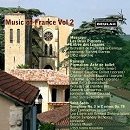 I
must apologise for falling behind with coverage of Beulah’s very
fine transfers of vintage recordings, especially their growing number
of Korean releases. I’ll try to catch up next time, but meanwhile
I refer you to a recent release, Music of France, Vol.2,
a very varied collection with MESSAGER Les Deux Pigeons; Entrée
des Tziganes (Orchestre de l’Opéra Comique Paris/Richard Blareau,
1952 mono), RAMEAU Pigmalion, acte de ballet (Soloists
and Lamoureux CO/Marcel Couraud, DG Archiv,1962 stereo) and SAINT-SAËNS glorious Symphony No.3, the ‘Organ’ Symphony, in the classic RCA performance
by Berj Zamkochian, the Boston SO and Charles Munch (1959 stereo).
Total time 78:01. Download from iTunes or amazon.co.uk or 7digital.com – the last named is slightly less expensive and comes at a better bit-rate.
The Messager receives a suitably lively performance in sound which sounds
more like 1962 than 1952. The Rameau is stylish for its day, before
the period-performance movement had got under way, though the faster
movements are taken at a lively pace that wouldn’t be out of place today.
The sound is a bit tubby but very acceptable.
I
must apologise for falling behind with coverage of Beulah’s very
fine transfers of vintage recordings, especially their growing number
of Korean releases. I’ll try to catch up next time, but meanwhile
I refer you to a recent release, Music of France, Vol.2,
a very varied collection with MESSAGER Les Deux Pigeons; Entrée
des Tziganes (Orchestre de l’Opéra Comique Paris/Richard Blareau,
1952 mono), RAMEAU Pigmalion, acte de ballet (Soloists
and Lamoureux CO/Marcel Couraud, DG Archiv,1962 stereo) and SAINT-SAËNS glorious Symphony No.3, the ‘Organ’ Symphony, in the classic RCA performance
by Berj Zamkochian, the Boston SO and Charles Munch (1959 stereo).
Total time 78:01. Download from iTunes or amazon.co.uk or 7digital.com – the last named is slightly less expensive and comes at a better bit-rate.
The Messager receives a suitably lively performance in sound which sounds
more like 1962 than 1952. The Rameau is stylish for its day, before
the period-performance movement had got under way, though the faster
movements are taken at a lively pace that wouldn’t be out of place today.
The sound is a bit tubby but very acceptable.
The Saint-Saëns is also available on Beulah Extra 13-14BX32,
to which I gave a warm welcome in December
2011/1: ‘In 1960 this recording on LP cost almost £2, around £50
today; even when reissued as an RCA Victrola LP in the late 1960s at
£0.99, the equivalent would be at least £20 in today’s values, so Beulah’s
asking price of £2.50 is very reasonable. There are some excellent recent
recordings in all price categories, but the Munch performance and recording
remain as recommendable now as then – no less a reviewer than Trevor
Harvey rated Munch only a little less highly than Toscanini – and the
sound was demonstration quality for its time’.
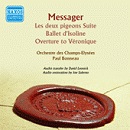 The
very enjoyable MESSAGER is still as out of fashion in non-Francophone
countries as it was in the early 1950s. The only currently available
rival is of similar vintage (1954), from the Orchestre des Champs-Élysées/Paul
Bonneau – the complete ballet Les Deux Pigeons, the ballet from Isoline and the overture to Véronique (Naxos Classical Archives 9.81043 – from emusic.com, mp3, or classicsonline.com,
mp3, or Qobuz, mp3 and lossless).
The
very enjoyable MESSAGER is still as out of fashion in non-Francophone
countries as it was in the early 1950s. The only currently available
rival is of similar vintage (1954), from the Orchestre des Champs-Élysées/Paul
Bonneau – the complete ballet Les Deux Pigeons, the ballet from Isoline and the overture to Véronique (Naxos Classical Archives 9.81043 – from emusic.com, mp3, or classicsonline.com,
mp3, or Qobuz, mp3 and lossless).
The sound is drier than the Beulah transfer and sounds its age much
more, though it’s acceptable. The emusic.com is the least expensive
at £1.26; from COL it costs £1.99 and from Qobuz £2.39. The lossless
version which I streamed from Qobuz sounds a little better than the
low bit-rate mp3 from emusic.com (a very mean 156-159kb/s), so it’s
probably worth paying the little extra. For copyright reasons it’s
not available in the USA and several other countries.
Freebies of the Month

 A
reminder that Hyperion and Divine Art both offer monthly free samplers of their latest offerings – click on
the names to follow the links. The Divine Art sampler for October 2014
contains excerpts from recordings of orchestral music by Carson COOMAN (DDA25117), RIMSKY-KORSAKOV (DDA25118, Scheherazade and Antar for piano duo, Anthony Goldstone and Caroline Clemmow)
and music by BACH, HANDEL, RITTER and others, ‘The Harmonious
Thuringian’ (DDA25022, Terence Charleston, harpsichord).
A
reminder that Hyperion and Divine Art both offer monthly free samplers of their latest offerings – click on
the names to follow the links. The Divine Art sampler for October 2014
contains excerpts from recordings of orchestral music by Carson COOMAN (DDA25117), RIMSKY-KORSAKOV (DDA25118, Scheherazade and Antar for piano duo, Anthony Goldstone and Caroline Clemmow)
and music by BACH, HANDEL, RITTER and others, ‘The Harmonious
Thuringian’ (DDA25022, Terence Charleston, harpsichord).
The October 2014 Hyperion sampler, HYP201410, is especially generous
at over 89 minutes, with music from the other labels 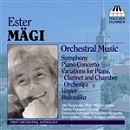 for
which Hyperion offers downloads as well as their own releases.
for
which Hyperion offers downloads as well as their own releases.
Another Freebie of the Month is contemporary
Estonian composer Ester MÄGI’s orchestral music on Toccata TOCC0054 [64:57]: the Piano Concerto (1953) [22:42], Symphony
(1968) [13:29] and other shorter works. Born in 1922, she has become
known as the first lady of Estonian music. The Estonian National Symphony
Orchestra is conducted by Arvo Volmer and Mikhel Kütson, with several
soloists. The freebie, complete with pdf booklet comes in decent mp3
for those signed up to theclassicalshop.net monthly newsletter but they also have it in lossless sound. I enjoyed
the music sufficiently to want to hear it again and to intend to explore
the only other album of her music available in the UK, on Alba (download
only). For full details see review.



 All Nimbus reviews
All Nimbus reviews








